UBS (UBS) 6-KCurrent report (foreign)
Filed: 7 Mar 22, 1:01pm
UNITED STATES
SECURITIES AND EXCHANGE COMMISSION
Washington, D.C. 20549
_________________
FORM 6-K
REPORT OF FOREIGN PRIVATE ISSUER
PURSUANT TO RULE 13a-16 OR 15d-16 UNDER
THE SECURITIES EXCHANGE ACT OF 1934
Date: March 7, 2022
UBS Group AG
Commission File Number: 1-36764
UBS AG
Commission File Number: 1-15060
(Registrants' Names)
Bahnhofstrasse 45, Zurich, Switzerland and
Aeschenvorstadt 1, Basel, Switzerland
(Address of principal executive offices)
Indicate by check mark whether the registrants file or will file annual reports under cover of Form 20‑F or Form 40-F.
Form 20-F x Form 40-F o
A message from our Chairman and Group CEO
Hear what our Chairman, Axel A. Weber, and Group CEO, Ralph Hamers, have to say about driving the firm forward.
(Transcript from the video)
Axel Weber: 2021 was a good year that put every business model - including our own - to the test. UBS has passed that test. Today, our firm is healthy and has strong momentum. We've proven our resilience in the ongoing pandemic with a balance sheet for all seasons. We’re a world-leading global wealth manager and the leading bank in Switzerland.
Ralph Hamers: Last year pushes to new heights. We proved how strong our ecosystem of people and capabilities is. For example, we worked across the firm discovering and launching our purpose. And then updating our strategy and ambitions to align with that. We pioneered new, more personalized relevant on-time and seamless interacting with our clients. And we redefined how we as a financial firm, can operate by making our teams work more agile and our work policies more flexible. And these will help us continue to grow and capture new opportunities as we look to the future.
Axel Weber: I'm confident that we have everything it takes to further develop our firm from a position of strength and tackle future challenges. Today, UBS is one of the best capitalized banks globally with a strong reputation among clients, employees and investors. Thank you to everyone who has made our success possible.
Ralph Hamers: And Axel I have to include you in that as well. You'll be leaving us this year. And your contributions to UBS over the last 10 years are a big part of why we are so successful and why we are in such a strong position. Thank you very much. UBS has a lot to be proud of. And even more to look forward to.
(End transcript)
Statement on Russia’s invasion of Ukraine
We are shocked by the violence and tragedy caused by Russia’s invasion of Ukraine. Our hearts go out to those affected and who are suffering.
We are working to implement sanctions imposed by Switzerland, the US, the EU, the UK and others – all of which have announced unprecedented levels of sanctions against Russia and certain Russian entities and nationals. These events, together with counter-sanctions and other measures by Russia, will have ongoing effects on markets and the global economy.
Currently, to help victims of the war in Ukraine, UBS Optimus Foundation and our Community Impact teams are providing emergency relief to refugees through the International Rescue Committee and are matching the first USD 5 million of donations from employees and clients, creating a combined impact of USD 10 million.
Support the Ukraine Relief Fund > https://www.ubs.com/global/en/ubs-society/philanthropy/optimus-foundation/ukrainerelief.html
4
Table of content:
A purposeful year
Read more on page 6
Inspire
Read more on page 13
A purpose, that's our purpose
Reimagining the power of investing. Connecting people for a better world. It’s more than just a statement: it’s our why. Find out how the UBS purpose came to light. Read more on page 16
160 years of UBS
From humble beginnings to a global presence: take a trip down memory lane as the firm celebrates another milestone anniversary, and look ahead to what’s next. Read more on page 21
Looking back on the last ten years and looking ahead
Our Chairman Axel A. Weber on the firm’s development in 2021 and over the last decade. Read more on page23
We are
Read more on page 25
Connect
Read more on page 28
Transformation for the firm, transformational for clients
Agile isn’t a new concept for the wider world, or for UBS. Hear from Mike Dargan, chief digital and information officer, and Stefan Seiler, group head of human resources, who’re leading UBS’s agile transformation. Read more on page 32
Connecting Mount Fuji to the Matterhorn
Our partnership with Sumitomo Mitsui Trust Holdings (SuMi Trust) is the first between a global financial group and a domestic trust bank in Japan. Here’s how it came to life. Read more on page 38
A hybrid approach
While 2020 was the year a lot of the world stayed at home, 2021 was the year that many of us made tentative steps back into the world – and UBS offices – where circumstances allowed. Read more on page 40
To thrill fans and support the community
The opening of the UBS Arena is a big step in enhancing our brand in a key market. Here’s how we prepared to open the doors of UBS Arena – despite challenges that the pandemic put in the way. Read more on page 45
Video advice: personal & convenient
When the world went virtual, our meetings with clients did too. Take a look behind the scenes of how UBS offers video advice to clients in our Swiss home market. Read more on page 48
Which way? My way.
First launched in Switzerland, the UBS My Way portfolio management solution has since enjoyed strong success across key European and Asian markets. Now it’s coming to more locations around the globe. Read more on page 52
Empower
Read more on page 55
Sustainability at UBS
A conversation with Suni Harford, GEB sponsor for sustainability and Michael Baldinger, Chief Sustainability Officer. Read more on page 58
Let our differences make the difference
With colleagues and clients around the world, taking both cultural and business needs into account is key to operations and sustainable performance at UBS. Hear from Group Head Diversity, Equity and Inclusion (DE&I), Cicilia Wan. Read more on page 61
No silos, only solutions
In the Americas region, UBS is connecting a growing number of clients with private markets opportunities to creatively put their capital to work. Read more on page 64
A global community
We’re committed to supporting the communities in which we live and work. Find out how our Community Impact program operates in all regions to make connections where they matter most. Read more on page 67
The power of philanthropic partnerships: a look at the UBS Collectives
We’re dedicated to finding innovative ways to tackle some of the world’s most pressing social and environmental problems, and showing how the power of philanthropic partnerships will be critical in achieving systemic change. Read more on page 72
Legal disclaimer, Page 75
5
A purposeful year

2021 in numbers and milestones.
A look at the key figures and major events that took place at UBS last year.
6
2021 in numbers
Group results
USD billion
7.5
Net profit attributable to shareholders
(2020: 6.6 USD billion)
USD
2.06
Diluted earnings per share
(2020: 1.77)
Resources
USD trillion
1.1
Total assets
(2020: USD 1.1 trillion)
USD billion
60.7
Equity attributable to shareholders
(2020: USD 59.4 billion)
Profitability
%
17.5
Return on common equity tier 1 capital
(2020: 17.4%)
Percent
14.1
Return on tangible equity
(2020: 12.8%)
Sustainability
USD billion
251
of sustainability-focus and impact investments (78% increase)
Percent
23
of client-invested assets are SI assets and assets subject to ESG integration and to exclusions
7
Year in review
January
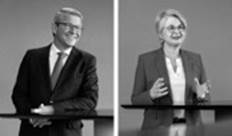
Changes to the UBS Board of Directors
The Board of Directors of UBS Group AG announced today that it will nominate Claudia Böckstiegel and Patrick Firmenich for election to the Board at the Annual General Meeting on 8 April 2021.
Read more: https://www.ubs.com/global/en/media/display-page-ndp/en-20210126-change-ubs-bod.html
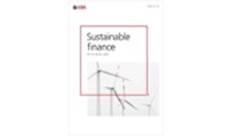
UBS beats impact investment target and launches white paper on sustainable finance for The Davos Agenda
UBS, the world’s leading sustainable investment manager, today launched a white paper on sustainable finance trends in 2021, after the firm exceeded a key target more than a year ahead of schedule.
Read more: https://www.ubs.com/global/en/media/display-page-ndp/en-20210128-wef.html
February

UBS BB Investment Bank and Banco Patagonia announce a commercial agreement for investment banking services in Argentina
Today, UBS BB Investment Bank (“UBS BB”) and Banco Patagonia announced an agreement to provide clients in Argentina with enhanced access to leading investment banking services and international capital markets, in accordance with applicable regulatory requirements. The agreement combines UBS BB’s global and regional platform and experience with Banco Patagonia’s robust capabilities and strong relationships across Argentina.
Read more: https://www.ubs.com/global/en/media/display-page-ndp/en-20210209-bb-investment-bank-agreement.html

UBS Multibanking available to corporate clients throughout Switzerland
UBS Multibanking allows corporate clients to access third-party bank accounts worldwide in UBS E-Banking and, as a first in Switzerland, to make payments directly via a single platform. The solution features a consolidated liquidity overview across all banks and currencies. Following the successful pilot phase, the service will now gradually be made available to all clients throughout Switzerland.
Read more: https://www.ubs.com/global/en/media/display-page-ndp/en-20210201-multibanking.html
8
March

Our quest for zero
We’ve reached our 2020 environmental goals. So what’s next? We continue to aim for less of an environmental impact, and in some areas, even for zero.
Read more: https://www.ubs.com/global/en/sustainability-impact/net-zero.html
April

Launch of our purpose
Our purpose guides us in everything we do. We call on our global ecosystem for investing – where people and ideas are connected, opportunities are brought to life and where our thought leadership can be impactful.
Read more: https://www.ubs.com/global/en/our-firm/our-purpose.html

UBS moves to 9 Penang Road
UBS moves into its largest Asia Pacific office at 9 Penang Road (9PR). This move brings over 3000 colleagues in wealth management, investment bank and asset management together.
Read more: https://www.ubs.com/global/en/media/display-page-ndp/en-20210429-move-to-9-penang-road.html
May
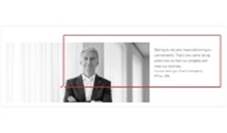
UBS appoints Chief Sustainability Officer and establishes new Sustainability and Social Impact organization
UBS today announced two senior appointments within its new Sustainability and Impact organization, which will lead activities across the firm to drive its sustainability agenda and deliver on its Net Zero commitments. The new organization will report to Suni Harford, Group Executive Board sponsor for Sustainability and Impact and President of UBS Asset Management.
Read more: https://www.ubs.com/global/en/media/display-page-ndp/en-20210505-beyond-net-zero.html

UBS launches Future of Earth fund
UBS Global Wealth Management (GWM) has launched the Multi Manager Access II – Future of Earth fund, which will aim to generate a compelling return by investing in companies addressing environmental issues and related challenges.
Read more: https://www.ubs.com/global/en/media/display-page-ndp/en-20210527-future-of-earth.html
9
June

UBS AG prices inaugural Green bonds
UBS AG today announces the pricing of two senior preferred unsecured Green bonds. This includes a 500 million euro-denominated five-year bond (ISIN: XS2358287238) and a 250 million Swiss franc-denominated seven-year bond (ISIN: CH1120085670).
Read more: https://www.ubs.com/global/en/media/display-page-ndp/en-20210622-green-bonds.html
July
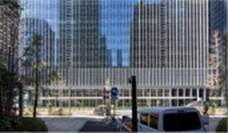
Otemachi One (OH-1) and Marunouchi Eiraku Building (Eiraku) offices open in Tokyo
After 23 years in Otemachi First Square, our colleagues in Tokyo have relocated to our new offices in Otemachi One (OH-1) and Marunouchi Eiraku Building (Eiraku). The Group Wealth Management team is co-located with the firm’s joint venture partner, Sumitomo Mitsui Trust, in Eiraku, while the rest of the employees have moved into OH-1.
August
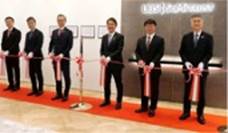
Ground-Breaking Wealth Management Venture Launches in Japan
UBS SuMi TRUST Wealth Management Co., Ltd. announced that it launched operations in Tokyo, Osaka, and Nagoya today. The new company is the first in Japan to offer global securities and wealth management capabilities together with the custody, real estate, inheritance, and wealth transfer expertise of a Japanese trust banking group.
Read more: https://www.ubs.com/global/en/media/display-page-ndp/en-20210810-ground-breaking.html
October

UBS launches collective philanthropy initiative to help clients address critical global issues
Harnessing the power of collective philanthropy, UBS today announced the launch of UBS Collectives (“Collectives”), an innovative social-impact initiative that connects UBS’s philanthropic clients on issues that matter most to them. Led by UBS’s Philanthropy Services team, UBS Collectives will help clients combine their expertise and mobilize their capital to fund initiatives that address child protection, climate change, health, and education-related issues.
Read more: https://www.ubs.com/global/en/media/display-page-ndp/en-20211007-philanthropy.html
10

Launch of Agile@UBS
Moving to agile will help us deliver better outcomes for clients. Here's how we'll get there.
Read more: https://www.ubs.com/global/en/our-firm/what-we-do/technology/2021/think-agile-be-agile.html

UBS joins the Valuable 500
Our CEO and 499 of his peers have signed up to the Valuable 500 to make disability inclusion part of their business leadership agenda.
Read more: https://www.ubs.com/global/en/our-firm/our-culture/diversity-and-inclusion/ability.html
November

UBS Arena opens
UBS Arena celebrated its grand opening last week with the first New York Islanders home game and a jam-packed series of events.
Read more: https://www.ubs.com/global/en/wealth-management/our-approach/marketnews/article.1551303.html
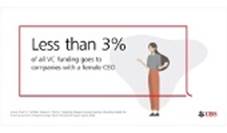
Project Female Founder
Building on the success of the Female Founder Award as part of the Future of Finance Challenge, our project mission is to accelerate female and non-binary founders in their success through a holistic program of investor readiness training and a global ecosystem of support to build relationships and networks.
Read more: https://www.ubs.com/microsites/future-of-finance-challenge/en/project-female-founders.html

UBS celebrates its first Female Founder Award winner as part of the Future of Finance Challenge
For the first time since starting the Future of Finance Challenge in 2015, UBS has presented a Female Founder Award as part of its Future of Finance Challenge. Around one-third of the overall entries qualified for this award.
Read more: https://www.ubs.com/global/en/media/display-page-ndp/en-20211104-ubs-future-of-finance-challenge-winners.html
11
December

UBS Optimus Foundation becomes founding member of the newly launched Sustainable Development Goals Impact Finance Initiative
It’s important to know that the solutions we're investing in are actually making a difference. We know that the only way to do this is to engage in strategic philanthropy – philanthropy guided by six key principles.
Read more: https://www.ubs.com/global/en/ubs-society/philanthropy/optimus-foundation/how-we-work.html
12
Inspire
Rethinking the potential of people and capital, through connections and thought leadership.
Scroll down to explore our Inspire story
A message from our Chairman and Group CEO
(Transcript from the video)
Axel Weber: 2021 was a good year that put every business model - including our own - to the test. UBS has passed that test. Today, our firm is healthy and has strong momentum. We've proven our resilience in the ongoing pandemic with a balance sheet for all seasons. We’re a world-leading global wealth manager and the leading bank in Switzerland.
Ralph Hamers: Last year pushes to new heights. We proved how strong our ecosystem of people and capabilities is. For example, we worked across the firm discovering and launching our purpose. And then updating our strategy and ambitions to align with that. We pioneered new, more personalized relevant on-time and seamless interacting with our clients. And we redefined how we as a financial firm, can operate by making our teams work more agile and our work policies more flexible. And these will help us continue to grow and capture new opportunities as we look to the future.
Axel Weber: I'm confident that we have everything it takes to further develop our firm from a position of strength and tackle future challenges. Today, UBS is one of the best capitalized banks globally with a strong reputation among clients, employees and investors. Thank you to everyone who has made our success possible.
Ralph Hamers: And Axel I have to include you in that as well. You'll be leaving us this year. And your contributions to UBS over the last 10 years are a big part of why we are so successful and why we are in such a strong position. Thank you very much. UBS has a lot to be proud of. And even more to look forward to.
(End transcript)
Our Chairman looks back on the last ten years : https://www.ubs.com/global/en/our-firm/annual-review-2021/inspire/articles/looking-back.html
...learn about how we are inspired through our purpose...

Reimagining the power of investing.
Connecting people for a better world.
Learn more about our purpose : https://www.ubs.com/global/en/our-firm/annual-review-2021/inspire/articles/a-purpose-thats-our-purpose.html
13
...meet our boards...
Board of Directors
Responsible for the overall direction, supervision and control of the Group and its management, as well as for supervising compliance with applicable laws, rules and regulations.
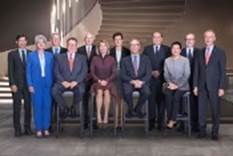
Group ExecutiveBoard
Across business regions, divisions, and functions: meet our most senior leaders.
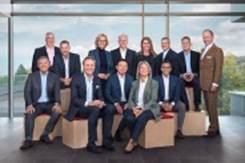
Find out more about our corporate governance: https://www.ubs.com/global/en/our-firm/annual-review-2021/inspire/we-are.html
...where and how we operate...
4 divisions
The best wealth manager(1) with scale in the world’s largest and fastest growing wealth markets.
A large-scale investment manager
The leading universal
bank in Switzerland
A focused investment bank
4 regions
30% of employees in the Americas
29% of employees in Switzerland
21% of employees in Asia Pacific
20% of employees in Europe, Middle East and Africa
Find out more about who we are: https://www.ubs.com/global/en/our-firm/annual-review-2021/inspire/we-are.html
(1) Euromoney Awards for Excellence 2021: World, Best Bank for Wealth Management
14
...a trip down memory lane...
160 years of UBS
From humble beginnings to a global presence
Read the full article: https://www.ubs.com/global/en/our-firm/annual-review-2021/inspire/articles/160-years-of-ubs.html






How we connect and empower.
15
A purpose that’s our purpose
Reimagining the power of investing. Connecting people for a better world. It’s more than just a statement: it’s our why. Find out how the UBS purpose came to light.
07 Mar 2022 7 min read
Key highlights
1. Finding the UBS purpose took months of asking the right questions to the right people, to define a statement that really reflected who we are and what we do as a firm.
2. Our purpose is at the heart of everything we do, and every decision we make.
3. The two parts of the statement work together and individually to connect people, ideas, and opportunities.
At UBS, we’re reimagining the power of people and capital, to create a better world for all of us – a world that’s fair, sustainable and gives everyone the opportunity to thrive. A key part of this is making connections: connecting people with other people, with ideas that deliver results to drive progress and innovation, and with opportunities that change people’s lives and help to forge a fairer society.


But setting our purpose by getting to the bottom of why UBS exists as a firm today, and what our ambitions for the future are, was no small job. It took months of asking a lot of questions to a lot of people, of listening to their answers and of reflecting on the feedback. Only then could we come up with a purpose statement that reflects who we are and represents our aspirations.
Matthias Schacke, Head Talent and Recruiting, and Hasmita Mistry, Head Brand Strategy, told us more about the journey to becoming a purpose-driven organization.
All about purpose (and why an organization like UBS needs one)
“Our purpose is a north star,” explained Matthias. “It stands for why we do what we do. It guides us in deploying our strategic priorities, and it helps us to decide where to grow and which opportunities to capture. Our purpose helps us and our clients to develop the future of UBS.”
Having this direction sets out a clear path in front of us, as well as setting the firm apart from the crowd.
16



The demands of our employees, our clients, investors and society are changing and evolving. What matters to them more and more is that a company shares their values, is authentic, and focused on the value they provide on what matters most, now and in the future.
Whereas Connecting is about enabling real and relevant connectivity with our clients from across the organization, Reimagining is about being forward thinking. The two parts of the UBS purpose statement work meaningfully as individual sentences, but equally together, showing powerful opportunities and unlocking the full potential of the organization.
“It’s more than a statement, and certainly not a marketing slogan,” added Hasmita. “A purpose-led organization uses its purpose statement as a roadmap to keep it on the right path.”
“It’s more than a statement, and certainly not a marketing slogan.”
A purpose holds us as individuals and as an organization accountable, authentic and reflective on our strengths and direction. But the only way for it to truly have an impact, and to achieve our vision to convene THE global ecosystem for investing – where thought leadership is impactful, people and ideas are connected, and opportunities are brought to life – is for everyone to embrace and live it, every day.



“Our purpose has to be present in each employee’s day-to-day work and be translated through into every decision we make, and across our entire chain and business practices,” said Hasmita. “Our clients, our investors and all of our stakeholders should feel the value in what they experience, and the difference our purpose makes to enhance the way our business runs and on timely decisions being made should be clear, too.“
17
From foundation to implementation
“Finding our purpose was a journey of discovery. It’s not something that we created or pulled out of thin air. Every company has a reason for being, but it’s not always clearly identified, or articulated. And that’s what UBS had to do: find that reason, articulate it, and make it front and center, so we could tell employees, clients and the world why we do what we do, and ultimately, why it matters,” said Hasmita.
With only one shot to get it right, we dug deep making sure to look at all angles – from what we’re good at, to what our firm’s value and role is towards all our stakeholders, clients and in society.
“A core team, together with more than 3,000 employees we called a ‘discovery squad’, who represented the diversity of UBS’s people, explored, listened and answered some of the fundamental questions,” explained Matthias. “We involved all employees throughout the journey, including members of the Group Executive Board and the Board of Directors, as well as thought leaders and clients. Themes including client centricity, our culture and three keys were frontrunners in discussions, and it became clear what was important to everyone.”
With the statement in place, thoughts turned to implementation and showing how the words work in practice. Becoming a purpose-led organization is a multi-year journey that will build confidence, empowerment and competence around our purpose – and success will come through taking people both inside and outside of the firm on the journey.
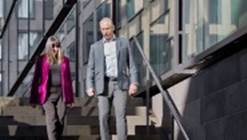

‘’Our purpose implementation program is keeping up the momentum over the coming years, with the goal of empowering our employees in a purpose-driven organization to drive our client promise, focus on the strategic imperatives and strengthen our culture,’’ said Matthias. “Ultimately, our purpose should be deeply embedded in our culture and leadership behaviors, making sure we create powerful business results from new products and services, deliver on the client experience and ensuring that UBS is globally recognized as one of the most attractive employers.’’
To help us fully embed our purpose, we have more than 600 purpose champions. They are viewed as role models and ambassadors showing the value of what happens when we talk, live and breathe purpose right across our firm. And, they help us roll out purpose-driven initiatives within the business and spot opportunities for growth.
The importance of shared values
“Shared values, as well as giving people space to connect in their own way with their purpose and the firms purpose, are important when it comes to linking the two,” said Hasmita. “Being authentic as a firm and as an individual is key to making sure this happens, and we need to help people connect to their individual purpose in areas where it might still be unclear to bring the best out of the workforce and client base.”
18
Looking to the future, we’ll roll out leadership training, learning resources and support with personal purpose journeys to help people link their individual purpose to the UBS purpose. We’ll also look to identify processes and business models in which we can (and should) embed our purpose, with the goal of making more purpose-based decisions.
In time, and thanks to the efforts during the creation of the purpose statement, our purpose will become so obvious and such a part of who we are that there won’t be an option to hide from it.
“It needs to be everywhere, but it doesn’t always have to be an explicit statement which people see,” said Matthias. “Over time, our purpose should come out naturally in the conversations we have with colleagues and clients.”
“Ultimately, our purpose should be deeply embedded in our culture and leadership behaviors, making sure we create powerful business results from new products and services, the client experience and that UBS is globally recognized as one of the most attractive employers.”
Here’s how having THE global ecosystem for investing fits in with clients’ lives – wherever they are, whatever their goals.
(Transcript from the video)
Having the global ecosystem for investing
To keep up with the ever-changing needs of our clients, we’re collaborating seamlessly across the firm to create value for them.
Our client's needs and expectations are changing at pace.
We need to adjust and fit into their lives, not the other way around.
By leveraging the scale and strong network effects that ourbusiness offers,
UBS is uniquely positioned to be the orchestrator of a global ecosystem for investing where thought leadership is impactful, people and ideas are connected and opportunities are brought to life.
Our ecosystem is a powerful gateway providing seamless access to the breadth of our solutions, complementary products and services from our network of curated partners. And a community of like minded participants and contributors that create a unique marketplace.
Utilizing our leading content, advice capabilities and personalized solutions, we not only attract prospective clients but also become more appealing to external partners.
This self reinforcing dynamic strengthens our value proposition, accelerates growth and allows us to reinvest in our core capabilities.
Our private credit funds business is just one example of the power of our ecosystem and how we collaborate seamlessly across the firm to create value for our clients.
19
We develop bespoke financing solutions for entrepreneurs with very specific and often complex financing needs.
We make this possible by matching them to wealth management clients and institutional investors with an appetite for alternative asset classes.
This makes UBS increasingly relevant for entrepreneurs.
They want to raise capital from a wide range of sources beyond public capital
markets. This is all part of living and breathing our purpose.
It's how we're re-imagining the power of investing and connecting people for a better world.
(End transcript)
20
160 years of UBS
From humble beginnings to a global presence: take a trip down memory lane as the firm celebrates another milestone anniversary, and look ahead to what’s next.
07 Mar 2022 5 min read
Key highlights
1. This year marks 160 years of UBS. From the foundation of our three keys to success to today’s forward-looking strategy: we’ve achieved a lot.
2. Everything we do and have today is built on the history and tradition, and the solid foundations, that our predecessor Groups set.
3. Our three keys to success continue to be a crucial part of our strategy and purpose going forward.
Today’s UBS is the result of the 1998 merger of two leading Swiss banks: Swiss Bank Corporation (SBC) and Union Bank of Switzerland. When the two banks merged, they brought with them a long history, enhanced by many other predecessor companies, that’s well rooted in the second half of the nineteenth century. Everything we do is built on that history and tradition, and the solid foundations that these predecessor Groups set. Along the way, various other firms, including US-based PaineWebber, have joined the Group. As one, they have overcome challenging times in the early- to mid-1900s, to focus on global expansion in the second half of the twentieth century.



A shift in business and culture
Today, our three keys are embedded into the firm at every level. Our Pillars (what we’re built on), Principles (what we stand for) and Behaviors (how we do it) are the foundation of our strong and inclusive culture. Among other things, these three areas incorporate a focus on simplification and efficiency, client centricity, and innovation.
“In 1938, SBC introduced the three keys as its symbol. It was firmly embedded in UBS’s logo in 1998.”
The concept is one that’s taken years to form. In 1938, SBC introduced the three keys as its symbol. It was firmly embedded in UBS’s logo in 1998, and, in 2011, that connection was made stronger with the launch of the three keys to success program. The foundation of the program formed the strategy, identity and culture of the firm as we know it now. And the launch of the Group Franchise Awards program to foster collaboration across the Group has even given employees the opportunity to submit – and be rewarded for – ideas to improve processes since 2016.
21
We also further advanced the execution of the firm’s first strategic transformation, completing it in 2014, and setting out on the path to develop the firm many are familiar with now.
With a well-founded culture, attention turned to amendments to the legal structure of the firm, to comply with the too big to fail requirements in 2014.
Then, moving from the legal structures to the structure of our buildings, there’s been a lot of developments since 2012. The official opening in Beijing of UBS (China) Limited in 2013 further enhanced the firm’s presence in the market, and we continued to take root in China, with a new branch in Shanghai, a new Business Solution Center in Wuxi, and UBS Business University in Shanghai all opening in 2016. And we also opened our new Singapore office at 9 Penang Road in 2021.
Closer to the Swiss home market, UBS’s new, and sustainably designed, London headquarters opened its doors to employees at 5 Broadgate in the same year, and, 101 years after it first opened, the Group headquarters at Bahnhofstrasse 45, Zurich, reopened in 2018 after three years of renovation work.
Going forward with purpose
In 2013, UBS further committed to maximizing efforts of investing according to sustainable and responsible criteria through a dedicated industry-leading platform. The subsequent launch of UBS and Society to combine and help to shape all activities and capabilities in sustainable investing and philanthropy, as well as UBS’s interaction with the communities, demonstrated our commitment. In 2021, we cemented this commitment to sustainability by establishing the Group Sustainability and Impact organization. As we are advancing toward 2030, the designated deadline to reach the 17 United Nations Sustainable Development Goals (the SDGs), our aim is to continue to be the financial provider of choice for clients who wish to mobilize capital toward the achievement of the SDGs and the orderly transition to a low-carbon economy.
“UBS was the first major global financial institution to make sustainable investments the preferred solution.»
The new division Global Wealth Management started off working as an integrated business and creating new opportunities for revenue growth and improving the ability to execute existing opportunities in 2018 and, in line with sustainable efforts, UBS was the first major global financial institution to make sustainable investments the preferred solution.
When we marked 150 years, we outlined a goal to focus on clients, offering them stability and dependability. The COVID-19 crisis demonstrated how years of sustainable thinking and acting delivered value for the firm and for clients by, for example, allowing strengthened support for business owners during the crisis and facilitating a seamless transition from the workplace to remote working, thanks to previous technology investments.
Looking ahead, the UBS purpose, which was launched in 2021, will help the firm build on these successes, by aligning all that we do with the purpose statement:
Reimagining the power of investing.
Connecting people for a better world.
22
Looking back on the last ten years and looking ahead
Our Chairman Axel A. Weber on the firm’s development in 2021 and over the last decade.
01 Mar 2022 4 min read



When elected to the Board of Directors and upon becoming Chairman in 2012, we outlined our path: ‘UBS was an icon of the Swiss economy. And the bank has to get back there.’
I’m proud that we are well on the way. UBS is again the leading bank in Switzerland. And it has become one of the world’s leading global wealth managers over the past ten years.
Rather than being just a financial services provider, we are seen and respected as a trusted advisor. A leader in sustainable finance. A great place to work for more than 70,000 employees in over 50 countries. And we’ve shown that we can generate attractive returns for our shareholders across different market environments.
The last few years have been like none before. The Russian invasion of Ukraine marks a historic turning point with far-reaching economic and geopolitical consequences. We are witnessing a human tragedy and additional geopolitical uncertainty – the consequences of which cannot be predicted at this point. Furthermore, the pandemic gripped the whole world and presented challenges for every aspect of society: politics, healthcare systems and the economy.
The past two years put every business model – including ours – to the test. And UBS has passed that test.
The firm is healthy and has strong momentum. We’ve proven our resiliency with a balance sheet for all seasons. Our divisions and regions are successfully meeting the many and varied needs of our clients, and the way our business areas complement each other is getting better all the time. Our strategy is focused on sustainable performance.
“The firm is healthy and has strong momentum. We’ve proven our resiliency in the ongoing crisis with a balance sheet for all seasons.”
That said, the pandemic has changed the economy, and the way we interact with each other. Technology and digitalization are becoming even more important and at UBS, we have made it a priority to turn technology from an enabler into a differentiator for our business.
23
Looking ahead, climate change is another – if not the – major challenge for our society. It can be tackled successfully only if there is global agreement, not only on the problem but also on the solutions. Sustainability has been a priority for UBS for many years. In 2021, we were once again recognized for our industry leadership in the Environmental dimension of the Dow Jones Sustainability Index. As a founding signatory of the Net Zero Asset Managers Initiative, we also announced our commitment to align USD 235 billion of assets under management to net zero by 2030. This is one of the largest absolute commitments of any member firm.
And looking beyond our own organization, I’m convinced that we have a huge opportunity to build the green capital market of the future – an important step toward solving our and future generations’ challenges.
“I’m convinced that we today have a huge opportunity to build the green capital market of the future.”
If we can get both the public and private sectors behind this agenda, a green capital market could have a market capitalization of USD 100 trillion globally. But harmonized standards and open markets are needed, so there’s still a lot of work to be done.
I look back in gratitude, not just on 2021, but on the last ten years. The whole team at UBS has done a great job in stabilizing and re-focusing the firm. We’ve gone from addressing legacy and remediation to implementing a successful strategy, focused on a unique and well-diversified business model that’s built on a strong culture.
Yet, the events of the past two years show that we live in uncertain times. The pandemic, the Russian invasion and geopolitical tensions globally, but also other challenges such as digitization, climate change, and the normalization of monetary policy will require UBS to respond nimbly and flexibly.
I’m confident that we have everything it takes to further develop our firm from a position of strength. Today, UBS is one of the best capitalized banks globally, with a strong reputation among clients, employees and investors. And I am confident that we will maintain this position in the future.
24
We are
The best wealth manager(1) with scale in the world’s largest and fastest growing wealth markets. The leading universal bank in Switzerland. A large-scale investment manager. A focused investment bank. That’s UBS. Drawing on our 160-year heritage and through our businesses, which all have a competitive edge in their areas of expertise, we provide financial advice and solutions to our global client base. To serve our clients best, we also aspire to attract, develop and retain a diverse range of highly talented employees, and to provide a supportive and inclusive workplace where everyone can unlock their full potential.
The best wealth manager(1) with scale in the world’s largest and fastest growing wealth markets.
We help our clients pursue what matters most to them. Individuals around the world look to us to provide them with the advice, expertise and solutions to preserve and grow their wealth – today, tomorrow and for generations to come.
>3.3
trillion US dollars in invested assets as of 31 December 2021
7
times winner of the Euromoney Awards for Excellence World’s Best Bank for Wealth Management in a decade
A focused investment bank
We’re focused on a client-centric offering that helps us provide value, and on being a leader in the areas we choose to compete in. We connect people to ideas and solutions through industry expertise and differentiated insights, products and services.
Top 3
in Institutional Investor’s Global Equity Research for the sixth consecutive year
A large-scale investment manager
With investment capabilities and investment styles across all major traditional and alternative asset classes, we are committed to sustainable outcomes, without compromise, with the aim of driving long-term performance and positive impact beyond returns.
1.2
trillion US dollars in invested assets as of 31 December 2021
The leading universal bank in Switzerland
UBS is Switzerland’s leading universal bank. And Switzerland is the only country where we’re active in retail banking, corporate and institutional banking, wealth management, asset management and investment banking.
~ 30%
of Swiss households are UBS clients
2.6
million clients in Region Switzerland
(1) Euromoney Awards for Excellence 2021: World, Best Bank for Wealth Management
25
Corporate governance
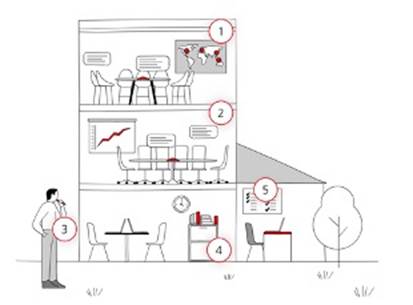
1) Board of Directors
The BoD of UBS Group AG, led by the Chairman, consists of between 6 and 12 members, as per our Articles of Association. Shareholders elect each member of the BoD individually. The BoD of UBS Group AG has five permanent committees: the Audit Committee, the Compensation Committee, the Corporate Culture and Responsibility Committee, the Governance and Nominating Committee, and the Risk Committee. They assist the BoD in the performance of its responsibilities.
In 2021, the BoD met 22 times, next to numerous committee meetings. The average duration of the meetings was 130 minutes. 12 BoD meetings were attended by the GEB.
BoD geographic diversity in 2021
42% Switzerland
17% US or Canada
17% Europe
25% Asia
2) Group Executive Board
All members of the GEB, with the exception of the Group CEO, are proposed by the Group CEO. The appointments are approved by the BoD. In 2021, the GEB held 66 meetings.
GEB geographic diversity in 2021
33% US or Canada
33% Europe
25% Switzerland
8% Asia
3) Shareholders
The general meeting of shareholders is the supreme corporate body of UBS. It must be held within six months of the close of each financial year. In 2021, physical attendance at our general meetings was not possible, due to COVID-19-related restrictions, and voting rights could only be exercised through the independent proxy. The same setup is planned for our annual general meeting on 6 April 2022.
4) Group Internal Audit
Group Internal Audit is an independent voice to safeguard and strengthen UBS. It supports the Board of Directors in discharging its governance responsibilities by taking a dynamic approach to audit, issue assurance and risk assessment.
5) Group External audit
External auditors perform financial statement audits and audits of internal controls over financial reporting, and regulatory audits. While safeguarding their independence, the external auditors also coordinate their work with Group Internal Audit.
26
Our boards
The functions of Chairman of the Board of Directors (the BoD) and Group Chief Executive Officer (Group CEO) are assigned to two different people, ensuring a separation of power. The BoD delegates the management of the business to the Group Executive Board (the GEB).
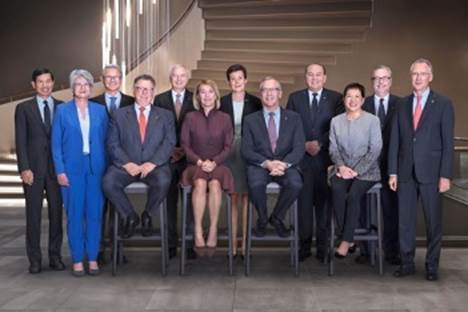
Read more on Board of Directors: https://www.ubs.com/global/en/our-firm/governance/ubs-group-ag/board-of-directors.html
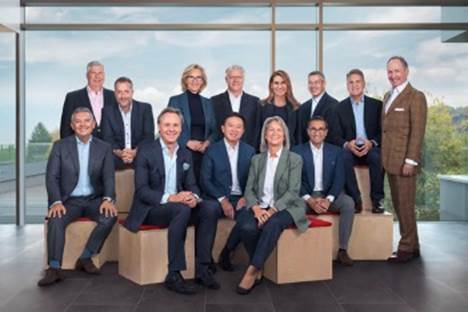
Read more on Group Exectutive Board: https://www.ubs.com/global/en/our-firm/governance/ubs-group-ag/group-executive-board.html
27
Connect
Joining the dots to drive change for a better world.
Scroll down to explore our Connect story
Which way? My way.
By combining the very best of our digital capabilities with over 160 years of wealth management expertise and insights, we’ve moved investing into the twenty-first century.
USD 1 billion in assets reached just six months after launch
USD 3 billion in assets reached in under a year
more than 4,500 clients used solution by 31 December 2021
over 1,700 portfolio adjustments made by clients
Read the full article: https://www.ubs.com/global/en/our-firm/annual-review-2021/connect/articles/which-way-my-way.html
...this and other great achievements done while we were...
Hybrid working

“Being forced to work from home certainly opened our minds to alternative ways of working.“
“There’s definitely a balance to be struck between flexibility and retaining some structure.“
“I had to learn to trust my team in a way that I didn’t have to consider before.“
“During the first lockdown we started having a team huddle every morning and have kept it post return to office to make sure no one feels left out wherever they’re working.“
Read the full article to find out why not every good piece of work has to be done in an office: https://www.ubs.com/global/en/our-firm/annual-review-2021/connect/articles/a-hybrid-approach.html
...with a focus on clients, as always...
28
Remote Sales & Advice
When the world went virtual, our meetings with clients did too.

How it works?
1
Call us or arrange a call-back to set up an appointment.
2
We confirm the appointment by phone and answer any initial questions
3
You will receive a Zoom link to the consultation via email.
Read the full article to see how we deal with remote advice: https://www.ubs.com/global/en/our-firm/annual-review-2021/connect/articles/video-advice-personal-convenient.html
...using technology as an enabler...
Transformation for the firm, transformational for clients
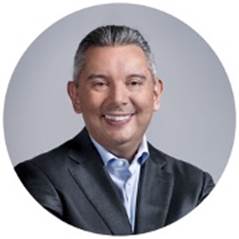
“Increasingly, agile will be an essential tool to deliver on our client promise of a personalized, relevant, on-time and seamless experience.”
Mike Dargan
Chief digital and information officer
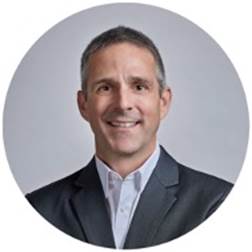
“For employees, agile means moving away from traditional forms of governance, to create a more flexible, more productive firm.”
Stefan Seiler
Group head of human resources
Read the full article to learn about our agile ways of working: https://www.ubs.com/global/en/our-firm/annual-review-2021/connect/articles/transformation-for-the-firm-and-for-clients.html
...for us, business also happens in entertainment venues...
29
UBS Arena
To thrill fans and support the community

Was designed and built in accordance with the strictest environmental, sustainability and energy standards.

Ten thousand jobs were created during construction, with plans in place for 30 percent of permanent jobs to go to residents of its surrounding neighborhoods.

Thirty percent of construction funds were earmarked for state-certified minority and female-owned businesses.
30
Read the full article to learn how we prepared to open the doors of UBS Arena – despite challenges that the pandemic put in the way: https://www.ubs.com/global/en/our-firm/annual-review-2021/connect/articles/to-thrill-fans-and-support-the-community.html
...partnerships are a big part of what we do...
Connecting Mount Fuji to the Matterhorn

This joint venture is the first between a global financial group and a domestic trust bank in Japan.
Read the full article to see how we’re continuing to expand and make strategic moves: https://www.ubs.com/global/en/our-firm/annual-review-2021/connect/articles/mount-fuji-to-matterhorn.html
How we empower and inspire.
31
Transformation for the firm, transformational for clients
Agile isn’t a new concept for the wider world, or for UBS. Hear from Mike Dargan, chief digital and information officer, and Stefan Seiler, group head of human resources, who’re leading UBS’s agile transformation.
07 Mar 2022 7 min read
Key highlights
1. Agile isn’t a new concept – but it will certainly become more prominent in the future.
2. Change is a constant in the banking industry, and UBS is setting the pace to keep up with the ever-changing environment.
3. Being an agile organization means working across teams, divisions, and regions to deliver a more streamlined client experience across the firm.
In the banking industry, change has been a constant and, today, the pace of that change is more rapid than ever. Across all sectors, established incumbents are being challenged by disruptors who promise clients and employees something new and better.


“At UBS, we believe the key to navigating this turning point and succeeding in the future is agile working,” said Mike. “Increasingly, agile will be an essential tool to deliver on our client promise of a personalized, relevant, on-time and seamless experience. We’ve already seen examples of how it’s helping us stay ahead of the game.”
“At UBS, we believe the key to navigating this turning point and succeeding in the future is agile working.”
“Agile@UBS enables flexible, multi-disciplinary teams working across the firm to deliver greater business and client value, and to fulfill our purpose,” explained Stefan. “It does this by removing friction and dependencies, creating small, empowered teams, with clear ownership, and common objectives, and delivering incremental business value faster.”
32
Already well on the way
Many employees already work in agile pods (small, multi-disciplinary teams) across UBS, forming a solid foundation of an agile mindset, skills, practices, and knowledge. These pods are complemented by larger agile crews to ensure alignment and consistency, and further by agile chapters to encourage best-practice sharing. The success of this approach in many areas of the firm showed that this flexible method can improve our way of working, to the benefit of employees and clients. To have a unified, agile way of working across the whole firm, which takes the best elements from our existing agile practices, we opened up Agile@UBS to more employees.
“By doing so, we want to respond quicker to our clients’ ever-changing expectations,” said Mike. “We also aim to optimize for the challenges and opportunities of the digital age, and benefit from a step change in performance – in speed of delivery, client satisfaction, employee engagement, and efficiency.”
Going forward, Agile@UBS will continue to transform the way the firm operates, offer learning and growth opportunities for all our people, and help make UBS a top digital place to work.
“We have experience in agile ways of working – we’ve operated successful agile models for many years. We’re building on the best of those to craft a unified model that will make our business better now and for the future,” explained Stefan.
Driving us forward
At times, agile has been incorrectly characterized as being unstructured. But, in reality, it’s a well-defined way of working that allows teams to speed up innovation and lower risk – all while providing faster and better outcomes for clients. To develop our model, we’ve relied on two areas of expertise in particular: technology and people.
“Change at this level requires an overhaul across key parts of the organization, including IT, HR, and operations. But, arguably most importantly, it requires a mindset change across the board,” said Stefan. “For employees, agile means moving away from traditional forms of governance, to create a more flexible, more productive firm.”
“Agile working will allow us to create tailor-made products more quickly, as well as a data-centric, omni-channel and self-service experience – this is what will enable us to make tech a differentiator for our firm, and that will guarantee we provide clients with the best possible service.”
“Even those who aren’t yet working in official Agile@UBS pods will be encouraged to learn agile ways of working that they can adopt to make us all more productive, more streamlined, and able to deliver our best. In our Agile Academy within UBS University, our employees can develop the right skills,” he continued.
And, when the process works well internally, the results are clear externally. To give an example of the success of agile to date, it’s been instrumental in reducing testing time and, as a result, increasing the speed of transactions on trading platforms. It’s a clear opportunity for greater operational efficiency and reduction in time-to-market; and that’s something that benefits everyone.
33
“Agile working will allow us to create tailor-made products more quickly, as well as a data-centric, omni-channel and self-service experience – this is what will enable us to make tech a differentiator for our firm, and that will guarantee we provide clients with the best possible service,” added Mike.
Delivering our purpose
To reimagine the power of investing and connect people for a better world, we need to become an even more responsive business, with teams that have our clients and our products at the center of all they do. When we work in an agile way, we reimagine the way we work, the way we connect with each other – our colleagues, clients and partners – and the way we deliver value.
With Agile@UBS, we’ll align the whole firm to make sure everyone approaches operations with the same client focus. We know the power of investing, and Agile@UBS will unleash that power, helping us live up to our purpose while, at the same time, delivering on our strategy.
Agile in action: a team in the spotlight
As Mike and Stefan explained: being agile isn’t an entirely new concept for the wider world, nor for our firm. The Client Needs Stream “Plan My Wealth” (or agile ‘stream’), is one of many teams working in an agile mode. Stream product lead Christine Deilmann explains what this means for them.
“We started the transformation with a fundamental review of our organization based on client needs,” Christine explained. “We created pods (multi-disciplinary teams), crews (pods working together to create a broader overview) and streams (crews working together for a common purpose) to bring all necessary people and skills together in one team.”
“When we selected the pod leads, the decision was made jointly by the business and the tech side, to make sure both parts are well represented,” added Roland Brandes, Stream tech lead of “Plan My Wealth”. “The UBS Wealth Way tool, for example, is one of the key developments. And that involves software developers, business experts, designers and data experts, to name only a few.”
“Key for me in this agile transformation was not only the change of working methodology in the teams, but much more to move into an agile mindset in the collaboration together with the whole organization,” he added. “As a Stream tech lead, it was also extremely important and challenging to continuously deliver changes and business value, while keeping the production stable with high availability for our clients and client advisory also during the transformation phase.”

34
Having agile coaches is essential. They keep the focus on the right things and make sure everyone in the boat is rowing at the same pace. The key to success for agile is sharing information transparently, establishing continuous improvement and feedback loops, and focusing on what really matters which involves having the courage to reprioritize relentlessly if needed. But it’s not an overnight transition.
“It takes time to become fully agile!” Christine said. “But, by putting the work in at the beginning to truly learn the best methods, in the long-term, the benefits will be enormous.”

Think agile. Be agile.
(Transcript from the video)
Transcript: Think agile. Be agile.
35
Learn more about where we’re headed as we set off on our exciting journey to implement one Agile@UBS model across our firm.
When the world around us is rapidly changing, standing still is not a choice.
Clients expect us to be ahead of changes, to lead the way.
That's why we no longer go the traditional way.
Instead, we become a truly agile organization.
Think agile. Be agile. Reimagining the way we work, the way we connect people and the way we deliver value.
Reimagination requires courage to challenge our preconceptions to innovate, to learn, to establish a new mindset.
It's a journey worth taking because being a more responsive business means better outcomes for our clients and our teams.
Unlocking tomorrow means unlocking the full potential of UBS.
From now on it's autonomy at all levels, but with alignment. How do we do that?
Well, that's the best part.
At UBS it's no more them and us, only we. We have a clear vision, but instead of telling people what to do to achieve this vision, we must trust our teams to direct us and empower them to decide because they know best what our clients need now and in the future.
Moving forward, we will align on one consistent Agile@UBS approach with an agile mindset that applies across the firm.
For some teams this will also mean a change of set up.
Let's talk Pods, Crews and Chapters.
A pod is a multidisciplinary team aligned to a product. It's typically 5 to 10 people and has all the skills needed to deliver autonomously.
Each pod consists of different disciplines, such as data analysts, user experience designers, marketing experts or technology engineers.
A pod has a product owner who keeps the pod aligned on the objectives and key results.
Each pod has a clear purpose.
This is autonomy partnered with alignment.
This is key because our teams are no longer constrained by dependencies.
They go faster with quality.
They're agile.
But how can we ensure coordination between the pods?
That's where crews come in.
A crew is a collection of five to 10 pods aligned to services made of multiple products and value streams such
as digital channels or investment product journeys. Crews ensure that pods can work together at scale and they provide strategic vision.
36
A crew has a product manager and delivery manager who ensure effective alignment.
But how can we ensure that knowledge and good practices flow across pods and crews?
That's where chapters come in.
These are groups of people with similar roles, skills and interests, whether that be marketing, client journey or compliance. They come together to share knowledge and experience.
So an idea from one pod quickly spreads to the others.
There are many areas in the bank that can benefit from such an agile setup, and some already do. Becoming agile is a journey over time.
We need to all start adopting the mindset and for the specific model and practices we will start in the areas where we see the most benefit to reimagine the power of investing and connect people for a better world.
UBS becomes a more responsive business with teams that have the client and product at the center of all they do.
Join us on this exciting journey to make UBS a better place to work and a preferred partner for our clients.
Think agile. Be agile.
(End transcript)
37
Connecting Mount Fuji to the Matterhorn
Our partnership with Sumitomo Mitsui Trust Holdings (SuMi Trust) is the first between a global financial group and a domestic trust bank in Japan. Here’s how it came to life.
07 Mar 2022 4 min read
Key highlights
1. Our partnership with Sumitomo Mitsui Trust Holdings (SuMi Trust) is the first between a global financial group and a domestic trust bank in Japan.
2. This partnership enables UBS to deliver capabilities that we couldn’t cover alone in the country.
3. The venture is Japan's first-ever one-stop shop for the wealth management needs of high net worth and ultra high net worth individuals.
In Asia Pacific, the world’s fastest-growing market, we’re continuing to expand and make key strategic moves to engage in more business opportunities and to connect with a broader client base. As part of this effort, the operational side of the partnership between UBS Japan and Sumitomo Mitsui Trust Holdings (SuMi Trust) opened for business in 2021.
Building on our 50-year history in Japan, the partnership marries the Swiss insights, as well as the 160-year traditions and global capabilities of our firm, with the power, scale and knowledge of Japan’s premier trust banking group, which specializes in bringing inheritance, real estate and loans, as well as wealth transfer services to high net worth clients. Importantly, these are capabilities that UBS could not provide alone in the country.


The tie-up between the two will give high net worth clients in Japan an offering unmatched in scope and quality by any domestic or global peer. The country has an estimated USD 17 trillion of investible assets, much of which is not yet served by wealth advisors – so, as well as bringing with it many opportunities, this venture is also a substantial boost to our brand profile in an enormous, yet relatively untapped, market.
“With the addition of SuMi Trust's broad range of real estate, trust and loan services, we can now offer Japanese clients a portfolio of products and services equal to what UBS offers its clients today in Switzerland,” said Japan Country Head Zenji Nakamura.
“With the addition of SuMi Trust's broad range of real estate, trust and loan services, we can now offer Japanese clients a portfolio of products and services equal to what UBS offers its clients today in Switzerland.”
38
Taking opportunities where we see we can make a difference
Soon after the partnership was announced, the two groups established a consultation and event organizing company to identify prospective new clients, and also began introducing each other’s products to their respective client bases. They also worked hand-in-hand to create and introduce UBS SuMi TRUST Wealth Management, so that it could deliver a uniquely broad and relevant portfolio of benefits to wealthy clients across Japan.
The venture is Japan's first-ever one-stop shop for the wealth management needs of high net worth and ultra high net worth individuals. The partnership is certainly a significant event, and one of a number we've formed recently around the globe as we seek to offer our firm’s unique expertise in more markets. In 2020, for example, UBS Securities became the first foreign joint venture to gain market maker-status and access to China’s USD 12 trillion bond market. And a binding agreement for a UBS-controlled, jointly owned investment bank in Brazil, as well as a number of other key South American markets, aims to position UBS well to become the top bank with leading investment capabilities in another region where we see significant growth potential.
Setting the foundations for a prosperous future
Connecting people is at the heart of what we do. Every day, our global team of around 70,000 employees links people up with others, and to ideas and opportunities that make a real difference. Switzerland as a nation is highly regarded in Japan, seen as having a deep commitment to quality and attention to detail, as well as being a trustworthy country. And, as a firm with deep Swiss roots, we try to evoke those same qualities as we present ourselves in other overseas markets, too.
UBS SuMi TRUST Wealth Management is the first to bring Japan a full array of wealth management capabilities, on an equal scale with the world’s other private banking markets, in a truly holistic offering. As a key market for our firm, Japan offers huge opportunities, not only for wealth management, but also for our investment banking and asset management capabilities.
“This venture provides a substantial boost for our overall business in Japan, bringing new business opportunities and reputational benefits to the entire firm,” Zenji continued. “It also offers further testament to our long-term commitment to the Japanese market.”
39
There for the client, from wherever we work
While 2020 was the year a lot of the world stayed at home, 2021 was the year that many of us made tentative steps back into the world – and UBS offices – where circumstances allowed.
07 Mar 2022 10 min read
Key highlights
1. Our hybrid working model allows flexibility for employees and clients alike when it comes to in-person meetings and remote advice. Here’s how we’re meeting clients’ needs.
2. It’s a combination of the working from home model we employed when the pandemic hit and a tentative step back into office space.
3. The key part of this way of working is finding a balance between what works for the organization and the clients we serve.
The pandemic forced many people to drastically change their ways of working. For UBS, it meant being almost fully remote, with over 95% of employees enabled to work from home right at the start of the pandemic, including client advisors.
After seeing what was possible when working remotely, we’re now committed to offering employees the flexibility to work both at home and in the office, where job role and location allow. For clients, this hybrid working model builds on the success of Remote Sales & Advice that expanded rapidly at the start of the pandemic in the Swiss home market, and gives them a choice on how they interact with the firm, while offering first-class, top-quality advice, no matter where their advisor sits.
We’re focusing on fulfilling our client promise as an outcome of hybrid working by, among other things, looking at how we can hold efficient and effective virtual meetings, finding new ways to engage with new clients and build on trusted client relationships both virtually and in person, and creating pathways to more flexible work schedules. To succeed in implementing a hybrid working model long term, we need to operate with agility and care, while also taking factors like regulation, risk, and productivity into consideration.
Digital interactions offer different and even additional benefits to in-person meetings, encouraging more innovative thinking, and giving clients and employees more flexibility. But, while there’s certainly value to this side of the hybrid model, the importance of in-person interactions shouldn’t be underestimated, and will remain an important component of our relationships, both internally and with our clients.
40

David James, Head Global Banking UK, Malcolm Gordon, Head UK Institutional Client Coverage, and members of their teams told us how a well-balanced approach helps us meet the needs of both employees and the business, and further evolve into a more agile organization.


Keeping an open mind
Having both operated fully from the office pre pandemic, David and Malcolm’s teams were among the many that faced a shock to the system when the pandemic hit.
“My team has 40 people in it, mostly more senior employees, due to nature of our investment banking business,” David explained. “Being forced to work from home certainly opened our minds to alternative ways of working – there was a huge discussion about what the right thing to do was, for us and for our clients – once the necessity to work from home full time was gone.”


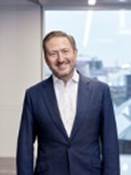
“Being forced to work from home certainly opened our minds to alternative ways of working.”
Another important aspect, he noted, was acknowledging that this was new for everyone; no employee or client knew how to operate in a hybrid model officially. And, as with everything, there would be a period of testing out options and making mistakes, but still recognizing that there’s definitely something here that could work – for both sides.
41
“When we were deciding how our work pattern would look on return to office in 2021, we got together as a team – when it was safe to do so – and just talked at a very human level, focusing on what works and what doesn’t, based on our experiences in the 2020 lockdown,” he explained. “Those meetings were really constructive: you could almost sense that, after each one, we were inching closer to something that actually works now and for the future. Everyone agreed that whatever we did, one hard requirement was to enhance the client experience of UBS.”
“I had to learn to trust my team in a way that I didn’t have to consider before.”
For Malcolm’s team, the issues – and dynamic – were different.
“We’re only five people, sitting within a broader client coverage unit, providing asset management services to clients. In some ways, having a smaller team makes it easier to make decisions, but, in others, it makes it harder, because everything and every person is more visible,” he said. “I had to learn to trust my team in a way that I didn’t have to consider before because, in a smaller, close-knit team in the office, having an overview of what people are working on simply by walking past or overhearing conversations is naturally easier than it is when you’re all at home. Not having that in the same way doesn’t mean things can grind to a halt, though, because their clients still need to be served and business has to continue.”
“One thing I would say without doubt, is that the joke of ‘Working from home? Enjoy your day off.’ is definitely no more!”


Hybrid working in practice
Like all good plans, the proof isn’t on paper, but rather in reality. For David and his team, this meant being particularly aligned with their time management.
“When we do go to the office, we try to all go in on the same days. We lean towards a Tuesday, Wednesday, Thursday pattern, with more flexibility on Monday and Friday,” he said. “But the big difference is evening work. Whereas, previously, we’d spend long hours at our desks in the office, often waiting around between emails and replies, now, I don’t see any reason why that work can’t be done in a more condensed way at home, after using the waiting around time to travel.”
The focus, as always, is on being available to talk to clients and address their questions at a time that works for them, either during the day or in the evening at a convenient timeslot for both.
42
“There’s definitely a balance to be struck between flexibility and retaining some structure,” agreed George Dracup from David’s team. “I do see the benefits of being in an office and do also see a keenness to get back some of the structure and team culture that comes with all being in the one place. But, I’m equally glad to still have some flexibility, particularly when it comes to managing sometimes-long hours more flexibly.”
“There’s definitely a balance to be struck between flexibility and retaining some structure.”
For Malcolm, keeping the team spirit up in split locations was top of the agenda.
“During the first lockdown, we started having a team huddle every morning and have kept it post return to office to make sure no one feels left out wherever they’re working and everyone can ask questions that they need to before everyone gets caught up with the day,” he explained. “Two of the team members actually joined during lockdown, so, as well as the huddle, we tried to meet in person when we could to welcome them into the team properly.”
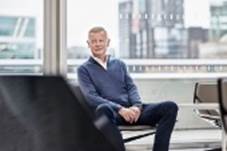


One of them, was James Rogers.
“I started in July 2020 after accepting the job offer in March, of course, being fully remote at the beginning,” he said. “I’d done my fair share of networking at my old job, so I tried to replicate that virtually. The morning call, as a mix of a work and social touchpoint, was definitely helpful to get to know the team.”
“One thing that I think probably happened quicker virtually than it would have in the office, was learning about a wider variety of products at a faster pace in the very beginning, because people took the chance to have proper introduction calls instead of just a quick hello while passing in the office.”
“During the first lockdown, we started having a team huddle every morning and have kept it post return to office to make sure no one feels left out wherever they’re working.”
A change for teams and clients, too
“One of the biggest challenges in my case was making sure everyone felt comfortable with the return to office arrangements,” said Malcolm. “A couple of team members were more hesitant to come back as soon as it was announced that we could, so we delayed until everyone felt ready, so that we could start this new approach to working together.”
43
From dealing with comments on why other people aren’t in the office to expectations of availability: moving from everyone at home, to some, if not all, venturing back to the office took some getting used to. And, with timetables changed once again, the idea that everyone should be available during the same, ‘normal’ working hours was up for question when it came to everything from team calls to client events.
“In my opinion, communication, almost overcompensating in your communication about where you are and when you’re available that week to your team and clients, is key to keeping things run smoothly,” David added.
While in-team logistics and talking are certainly a big part of working in a hybrid model, it’s only half of the story. With people in the office less frequently, and, so, less available for face-to-face meetings, clients and prospects have also had to adapt.
“When it was clear that the situation wasn’t only going to last a few weeks, there was a frenzy of client activity,” said Malcolm. “Now, further down the line, while clients might be settling more into their own hybrid working habits and in-person meetings are possible in most cases, there’s still definitely a consistent increase in virtual meetings, with clients less inclined to travel to their/our office for the sake of one meeting.”
Some surprises along the way
Many parts of the pandemic have been unpredictable – not least the things we didn’t know we’d ever have to think about. In both teams, there were elements of surprise as they adapted to the new normal again and again.
“The first thing that surprised me was my lack of ability to predict what people will want to do when it comes to their work pattern!” David said with a laugh.
“I’m also surprised by the people who wanted and equally didn’t want to come back to the office…it’s not necessarily as easy to assume as you’d think, for example, based on what you know about someone,” said George in agreement.
“In seriousness, the fact that the hybrid model works so well is, to some extent, a pleasant surprise – and one I hope continues,” added David.
“I think the most important thing is two-way flexibility,” said Malcolm. “It’s about deciding what works best for you, but also works best for the business you’re delivering, and meeting in the middle.”
“My biggest surprise,” he added, “was the change is my dress sense. I was a suit and tie guy before, and now I’m a lot more casual, depending on the day. The general shift in dress code that many of us have seen due to working from home is a small point, but still significant in what it represents.”
44
To thrill fans and support the community
The opening of UBS Arena is a big step in enhancing our brand in a key market. Here’s how we prepared to open the doors of UBS Arena – despite challenges that the pandemic put in the way.
07 Mar 2022 5 min read
Key highlights
The opening of UBS Arena is a big step in enhancing our brand in a key market.
1. It was all about balance when promoting a live entertainment venue to bring people together in the future, during a pandemic that required us all to stay apart.
2. As well as being a top-class live entertainment and sports venue, the Arena is an investment into the Tri-state area, where we have deep roots as a firm.
Just over a year-and-a-half since we announced the exclusive 20-year naming rights agreement for the New York Metropolitan area’s most eagerly anticipated, cutting-edge live entertainment venue, and home of the New York Islanders ice hockey team, UBS Arena finally opened its doors on Saturday, 20 November 2021.
“This is a landmark day for our firm and our brand. New York City is home to our Americas headquarters, and the metropolitan region has more UBS clients and employees than any other US market,” said Tom Naratil, Co-President Global Wealth Management and President UBS Americas, on opening day. “We have deep roots in the Tri-state area and a fundamental commitment to revitalizing the economy and growing our presence in the US. This is an opportunity to demonstrate and accelerate that commitment, while having a positive and lasting impact on the surrounding community.”
“We have deep roots in the Tri-state area and a fundamental commitment to revitalizing the economy and growing our presence in the US. This is an opportunity to demonstrate and accelerate that commitment, while having a positive and lasting impact on the surrounding community.”
On top of the initial USD 1.5 billion private investment in the Arena and its surrounding campus, UBS Arena, which is located on the historic Belmont Park horse-racing grounds 20 miles east of our offices in Midtown Manhattan, is expected to generate close to USD 25 billion of economic activity over the full term of our naming rights agreement. A welcomed boost to the regional economy after a slowdown of economic activity due to the COVID-19 pandemic.
Ten thousand jobs were created during construction, with plans in place for 30 percent of UBS Arena’s 3,000 permanent jobs to go to residents of its surrounding neighborhoods. Thirty percent of construction funds were earmarked for state-certified minority and female-owned businesses, and an additional USD 100 million of investment in transit and infrastructure enhancements, including the first newly constructed Long Island Railroad station in almost 50 years, a Metropolitan Transportation Authority bus stop and electric shuttles, will benefit residents and visitors for decades to come.
45


Support for the local area will extend to philanthropic and community outreach programs, such as our five-year partnership with 43 Oak Foundation – a youth hockey organization dedicated to increasing diversity and accessibility within the sport of hockey – as well as college and career-readiness and financial literacy initiatives that are being implemented into local school districts.
Brick by brick
In total, 750,000 bricks covering 700,000 square feet, to be precise.
UBS Arena was designed and built in accordance with the strictest environmental, sustainability and energy standards, with the goal of achieving a LEED v4 certification, the international benchmark for such large-scale, high-performance infrastructure developments. Across the East River, 1285 Avenue of the Americas, home to our Americas headquarters, holds LEED Gold certification, with UBS’s space on the first floor holding Platinum certification.
UBS Arena also aims to be 100 percent carbon neutral by 2024 by using only renewable energy, making it the first venue of its kind to achieve that on the US eastern seaboard. It’ll reduce water consumption by 40 percent compared with other buildings of its size by using low-flow plumbing.
As the doors opened to the public, a dedicated engineering team was enlisted to ensure that the air quality within the Arena was safe, as many people took tentative steps into large-scale events for the first time in almost two years. The latest sanitization solutions, including long-term protectants and sanitizers, are also firmly in place to minimize pathogens on all surfaces.
Then, to round off the experience with top-class catering facilities, a variety of food and drink is on offer from grab-and-go, marketplace-style vendors. The Arena will source 75 percent of ingredients within a 300-mile radius, based on seasonality. And, to reduce food waste, UBS Arena will partner with the venue concessionaire, Delaware North, and local food banks to donate appropriate unused food.
Curtains up
“We’re proud to have the UBS brand associated with a historic franchise like the Islanders and the country’s most state-of-the-art sports and entertainment venue.”
Tom Naratil joined in on cutting the ribbon to officially open UBS Arena on Friday, 19 November, the day before it opened to the public. The next day, after opening the NHL season with 13 games on the road, the four-time Stanley Cup champion New York Islanders brought the energy for the team’s long-awaited first home game at the venue, playing to a sell-out crowd of more than 17,000 fans in attendance. And, as our grand opening act, international pop star Harry Styles was the first musician to perform a sell-out concert a few days later.
46
“We’re proud to have the UBS brand associated with the country’s most state-of-the-art sports and entertainment venue and a historic franchise like the Islanders,” said Brian Hull, Executive Chairman UBS Americas.
UBS Arena Site Tour at halfway construction point
(video on https://www.ubs.com/global/en/our-firm/annual-review-2021/connect/articles/to-thrill-fans-and-support-the-community.html)
UBS Arena topping out ceremony
(video on https://www.ubs.com/global/en/our-firm/annual-review-2021/connect/articles/to-thrill-fans-and-support-the-community.html)
47
Video advice: personal & convenient
When the world went virtual, our meetings with clients did too. Take a look behind the scenes of how UBS offers video advice to clients in our Swiss home market.
07 Mar 2022 5 min read
Key highlights
1. Our client advisors were forced to hold meetings virtually when the pandemic hit – and now this is becoming part of our hybrid working model.
2. Remote Sales & Advice gives clients the opportunity to schedule meetings at a time that’s convenient for them – even outside of standard office hours.
3. Although we use call center technology, our advisors are experienced and provide personal and individual advice.
Even before the pandemic hit, perceptions of digital banking were changing for the better. Pre COVID-19, 10 percent of clients showed interest in video advice; this figure has doubled in the last year.
Today, 20 percent of our Swiss clients prefer to receive financial advice via video meeting for complex topics, like mortgages, investments and retirement. “We expect that demand for high-quality advice via this channel will increase in the coming years, when looking at the growth developments in other European markets,” explained Sabine Keller-Busse, President UBS Switzerland.
Video advice is positioned as personal and quality advice, which is also highly convenient as it’s accessible from home or the office, during the day or in the evening. To deliver this channel, UBS Switzerland built in a new Remote Sales & Advice organization in Personal Banking, Corporate and Institutional Clients and Wealth Management in a hugely limited time, with dedicated remote advisors and new technology.
Why our clients love remote advice
Like many industries, it’s all down to supply and demand.
“We found that the number of clients who needed video consultations exceeded the number of advisors we had available,” explained Head Personal Banking Simone Westerfeld. “Therefore, we decided to scale up our Remote Advice Hubs.”
Our remote advisors conduct between three and four advice meetings per day and client satisfaction, which is measured after each meeting, is very high. It’s clear that our clients consistently value the convenience, extended opening hours and professional set-up on offer. And, of course, the advice is personal and tailored to their needs; not a call center experience.
“We positively surprised clients. Although we use call center technology, our advisors are experienced and provide personal and individual advice,” said Arnoud Rozendaal, Head Remote Sales & Advice in Personal Banking.
48
Many clients cover their basic banking needs via digital banking, but, for complex topics like mortgages, investment and retirement planning, many still want personal advice from a client advisor, now increasingly in the most convenient way: through video consultation. By doing so, they have the chance to ask all the questions they want, while still saving time by talking to their advisor from home or office, and so taking away the need to travel to the branch. Remote advice meetings are also shorter, on average 45 minutes, and more focused due to the nature of a virtual discussion. And, with 25 percent of meetings taking place in the evening, it’s especially convenient for people who working during the day or prefer a discussion once their children are in bed.
“Clients love video advice because it is more convenient. They can talk to their advisor from home or the office, during the day or in the evening,” said Sabine.
49
more than 20% of clients prefer to receive financial advice via video meeting
over 45min on average which is shorter than an in-office meeting

Building up Remote Advice Hubs
It took a lot of hard work to get the new Remote Sales & Advice organization off the ground, and involved recruiting advisors from branches to work in our Remote Advice Hubs and training them on advising clients remotely. In short, the advice stays the same; it’s the same product, but presented in a different way. The advisor needs to be very structured and to the point in their explanation, as well as building trust and a human connection through video, while not being able to take the usual cues from body language.
Creating a simple, digital and secure process by using off-the-shelf technology and tactical solutions to allow for a fast time to market was top priority in making sure that advisors could work from home with minimal disruption to the client service. We also made sure to track each step in the journey. Initially, this was done manually, but we’re now digitizing that process to drive continuous optimization. Advisors in the branches were also equipped with video advice capabilities to keep our offering consistent and we also became paperless, being one of the first to use e-signature at scale.
“We had to do a ten-year sprint in only two years,” Simone explained.
The future is digital
With expectations that client demand for video advice in Switzerland will further increase in the coming years, services will be scaled even more to give more clients access to advice wherever it suits them best. Aside from allowing us to deliver a service clients want, this increase in availability is also in part made possible thanks to the economic benefits of video advice, as, by serving more clients in more meetings per day, UBS can grow revenue incrementally and reduce cost.
50
“To the outside world, there is one UBS.”
It’s likely that some of these clients will be remote only, while others will be hybrid clients, combining video advice with face-to-face meetings. In the end, our goal is to build a client needs driven distribution model, in which the channels operate seamlessly together. “To the outside world, there is one UBS, and clients can choose the channel they prefer,” said Sabine.
How a video consultation works
(Transcript from the video)
Transcript: UBS Remote Advice
Take advantage of a personalized face to face video consultation with high quality and professional support from our experts
Wouldn’t it be great
if you could get advice
from the comfort of your own home?
Now you can.
Take advantage of a personalized,
face-to-face video consultation.
Our expert advisors provide
high-quality, comprehensive
and professional support via video.
Whether you use a laptop,
PC or tablet
a video consultation is simple and secure.
We show you content
tailored to your needs
and guide you
through every step of the consultation.
Save time with a consultation
from the comfort of your own home
or workplace.
You choose the time of your appointment.
Whether you prefer mornings or evenings,
we’re here for you.
If you’re pressed for time,
you can speak to one of our advisors
within 24 hours on weekdays.
Arrange a convenient,
personalized video consultation session today
We look forward to hearing from you.
(End transcript)
51
Which way? My way.
First launched in Switzerland, the UBS My Way portfolio management solution has since enjoyed strong success across key European and Asian markets. Now it’s coming to more locations around the globe.
07 Mar 2022 6 min read
Key highlights
1. UBS My Way allows clients and their advisors to have meaningful discussions about the client’s financial goals, using technology as an enabler.
2. This digital solution gives clients the chance to personalize their portfolio on an iPad.
3. The real game-changer is the timely, relevant and actionable investment content provided by our award-winning Chief Investment Office (the CIO).
No two people are exactly the same – financial situations included. When thinking about what’s important to you and your family’s finances in the short and the long term, it’s important to leave no stone unturned. With UBS My Way, clients have a chance to do just that in a new and innovative way. Thousands of them have already worked with their client advisor to design their own portfolio on an iPad, tailored to their needs now and in the future, which is in line with their individual preferences, risk appetite and investment goals.
While the digital technology behind this next generation portfolio management solution is a key differentiator, the real game-changer is the timely, relevant and actionable investment content provided by our award-winning Chief Investment Office (the CIO).
The CIO – which celebrated its tenth anniversary in 2021 – is at the core of UBS’s investment ecosystem, bringing outstanding thought leadership and solutions to private wealth clients around the world. It’s made up of over 800 investment experts, who work in 18 locations and are responsible for investment advice and management for more than USD 3.3 trillion in assets globally(1). The team helps connect content, solutions, and clients by working across the globe 24/7 to identify and communicate investment opportunities, as well as market risks, supporting clients in preserving and growing their wealth.
“Being in control of your finances means being aware of the options available to you and having the chance to explore them in a simple and convenient way,” said Chief Investment Officer Mark Haefele. “That’s what UBS My Way, together with CIO’s industry-leading expertise, brings to clients.”
“Being in control of your finances means being aware of the options available to you.”
52
From proposal to pilot
In 2017, after noticing changes in client behavior and spotting a gap for a modular and customizable mandate solution that gave clients more control of their investment choices, a small core team combined all the necessary skills – including product design, knowledge of the investment process and portfolio construction, IT development and user experience – to create a first-look UBS My Way product.
This same core team was able to take the idea from a start-up approach to a fully scalable product with a huge growth potential relatively quickly, thanks to short review cycles and fast decision-making during the development process. In 2019, UBS My Way was launched as a pilot in just one country, in one language, for one client type – the minimum requirements possible – before first being rolled out as a full product in Switzerland in mid-2020.
Spoilt for choice
Wealth management has always been, and will always be, a people business – and UBS My Way has helped UBS to reimagine the client experience for the people who place their trust in us. By combining the very best of our digital capabilities with over 160 years of wealth management expertise and insights, we’ve moved investing into the twenty-first century.
In the same way that you would scan the aisles at a supermarket to find the best ingredients or scroll through the TV listings to choose the film to suit your mood, UBS My Way gives clients the chance to design their own portfolio on an iPad, choosing from around 60 building blocks, such as green bonds, future of the tech economy, sustainable investing megatrends or Swiss real estate, in line with their individual preferences, risk appetite and investment goals – all at the touch of a button. And new modules are added on a regular basis to reflect the latest investment themes and opportunities.
Using this method to build a portfolio allows clients and their advisors to have meaningful discussions about the client’s financial goals with technology as an enabler which can deepen relationships and trigger conversations about the topics that matter most.
“Everything we do, we do with clients and their goals in mind. UBS My Way fits seamlessly into our clients’ lives so they can plan for and reach their goals in a much more convenient, and frankly enjoyable way,” said Co-President Global Wealth Management & President EMEA Iqbal Khan.
“Everything we do, we do with clients and their goals in mind.”
53
A success for us and our clients
UBS My Way reached its two-year goal of USD 1 billion in assets under management just six months after launch and passed the USD 3 billion mark in under a year. By 31 December 2021, the solution had been used by more than 4,500 clients and had close to USD 7 billion in assets under management. And, thanks to regular after-sales communication, including monthly portfolio reporting, over 1,700 portfolio adjustments have been made by clients to reflect what’s going on both in the market and their lives. The UBS My Way solution has also been cited as a success factor in several awards, including the Euromoney World’s Best Wealth Manager 2021 award and the Financial Times PWM Wealth Tech Awards.
more than 4500 clients used solution by 31 December 2021
over 1700 portfolio adjustments made by clients

Last year saw huge changes to the way we interact with clients, but they have appreciated the opportunity to engage with us digitally whilst benefiting from our expertise.
As we strive to connect people and ideas, and bring the full UBS investment ecosystem to more and more people in a way that’s personalized and relevant to them, it would seem that My Way is indeed The High Way.
1) As at 31 December 2021
54
Empower
Enabling the right people to make a difference where it matters most.
Scroll down to explore our Empower story
Sustainability in action
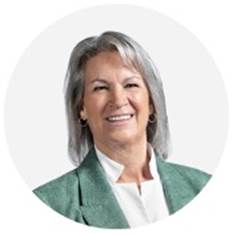
“UBS has been at the forefront in sustainable finance for many years and making it a core part of our purpose speaks to the bold ambitions we have.”
Suni Harford
GEB sponsor for sustainability
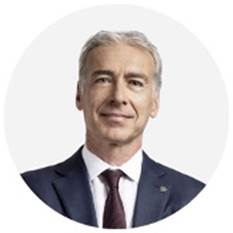
“Our focus on climate is not new for UBS, but it's a highly complex and multi-year effort to become a net zero bank.”
Michael Baldinger
Chief Sustainability Officer
Read the full article to learn more about our sustainability-related achievements and goals: https://www.ubs.com/global/en/our-firm/annual-review-2021/empower/articles/sustainability-at-ubs.html
...the power of philantropic partnerships...
A look at the UBSCollectives
While philanthropists can be effective individually, we believe they can be most impactful when working together with organizations and governments. They can reinforce each other's efforts, and achieve exponentially more impact.

Child protection

Climate change

Health- and education-related issues
Read the full article to find out how the three UBS Collectives contribute to meaningful change: https://www.ubs.com/global/en/our-firm/annual-review-2021/empower/articles/the-power-of-philanthropic-partnerships.html
...the power of society...
55
A global community
We believe that focusing on social impact is the way to build a fairer society, a more prosperous economy and a healthier environment.
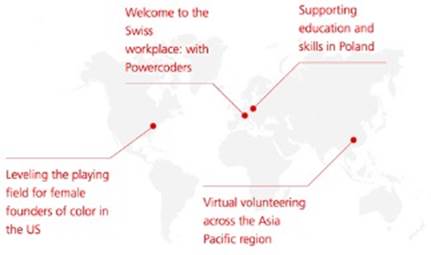
Welcome to the Swiss workplace: with Powercoders
Supporting education and skills in Poland
Leveling the playing field for female founders of color in the US
Virtual volunteering across the Asia Pacific region
Read the full article to learn how our Community Impact program operates across all regions: https://www.ubs.com/global/en/our-firm/annual-review-2021/empower/articles/a-global-community.html
...the power of a cross-business ecosystem...
No silos, only solutions

In the Americas region, UBS is giving a growing number of clients access to private markets capabilities, to open up opportunities to a wider audience.
Read the full article: https://www.ubs.com/global/en/our-firm/annual-review-2021/empower/articles/no-silos-only-solutions.html
...the power of diversity...
56
Let our differences
make the difference

“We make better decisions and are more innovative when we look at things from different perspectives and bring different opinions in.”
Read the full article: https://www.ubs.com/global/en/our-firm/annual-review-2021/empower/articles/let-our-differences-make-the-difference.html
How we inspire and connect.
57
Sustainability at UBS
A conversation with Suni Harford, GEB sponsor for sustainability and Michael Baldinger, Chief Sustainability Officer.
07 Mar 2022 7 min read
Key highlights
1. UBS has been a frontrunner in sustainability for more than 50 years: we know that what we do now matters in the future.
2. Having a part of the firm dedicated to sustainable performance means that our businesses are all aligned with our ambitions and targets.
3. Among other things, we’re focused on reducing emissions across all of our operations by 2050.
UBS has been a frontrunner in sustainability for over three decades, and our colleagues and clients are more than familiar with the topic. Together, we create an ecosystem that is giving our world a strong push towards a brighter future. Here’s how we’re still standing out from the crowd in creating better outcomes for today and future generations, as sustainable investing goes mainstream.

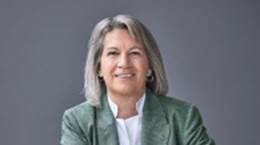
Why is sustainability so important in driving the firm forward? How does the topic fit with the UBS purpose?
Suni: The emergence of sustainability into the mainstream presents significant implications and opportunities for our firm and our clients. UBS has been at the forefront in sustainable finance for many years and making it a core part of our purpose speaks to the bold ambitions we have for the future. We want to be the financial provider of choice for clients who wish to mobilize capital towards the achievement of the United Nations 17 Sustainable Development Goals and the orderly transition to a low-carbon economy. As a leading financial institution, UBS also has a critical role to play in helping shape the industry and drive change. To help us do so, and to direct capital to where it is needed most, we are focusing on three key areas: planet, people and partnerships. In concrete terms, this means taking action on climate and supporting the transition to a net zero world, working to address wealth inequality through our philanthropy and community impact efforts, which are centered on health and education, and working in partnership with our clients, communities and other standard setters to achieve impact on a truly global scale.
58
What was your goal in establishing the new Group Sustainability and Impact organization?
Suni: Sustainable finance has evolved rapidly over the past five years as investors, regulators and other market participants have increased their focus on delivering sustainable outcomes. At the same time, there has been a drive for greater global convergence around definitions, terminology and standards to drive transparency and access to consistent data. The opportunities are almost limitless. By creating the Group Sustainable and Impact organization our goal is to position UBS to respond most effectively in this highly dynamic environment. Our focused team, which brings together our leading subject matter experts and thought leaders from across the firm, acts as a center of excellence, responsible for driving the implementation of our sustainability strategy and related initiatives, including our transition to net zero. It also plays a critical role in helping UBS’s businesses around the world to leverage the best of our sustainability and impact capabilities and insights, and supports them in engaging our entire ecosystem on behalf of clients.
How are you holding yourselves accountable and what progress are you making?
Suni: When we published our Net Zero and Beyond statement last year we outlined some clear ambitions. For instance, as a leading universal bank in Switzerland, we want to ensure we’re supporting the transition in our home market. In 2021 we became the first Swiss real estate platform to offer sustainable mortgages for investment properties in Switzerland. Another critical area we highlighted was our work around inclusive growth and a sharpened focus of our client and corporate philanthropy activities. Last year, UBS Optimus Foundation raised USD 161 million in donations and its activities improved the well-being of 4.6 million people. Of course, making sure that the full breadth of our sustainability ambition can be transparently tracked and measured is crucial too. That’s why our Annual Sustainability Report clearly sets out our goals, our targets, and most importantly, our progress against them.
A key milestone in 2021 was the publication of UBS’s Net Zero and Beyond statement. What are the next steps?
Michael: Our focus on climate is not new for UBS, but it’s a highly complex and multi-year effort to become a net zero bank. To map out our journey, including interim targets and key milestones along the way, we published our Net Zero and Beyond statement in 2021, marking our commitment to achieve net zero across all our operations by 2050 – and to support our clients on their journey, too. One of the first milestones on that path was the issuance of our inaugural green bond in the summer of 2021, a truly cross-firm effort which directly addressed growing investor demand.
“Our focus on climate is not new for UBS, but it’s a highly complex and multi-year effort to become a net zero bank.”
The next step will be to present our climate roadmap to shareholders at the UBS AGM in April. And, as you would expect, our teams are continuing to move full steam ahead on delivering on our net zero implementation plans.
59
Aside from driving our Net Zero implementation plans, what are your key priorities for 2022?
Suni: We have quite an ambitious agenda for 2022 and beyond. Delivering on Net Zero and continuing to expand the firm’s sustainability and impact offering will certainly remain at the forefront of our priorities. This includes building on the commitments we made in 2021, such as the Net Zero Banking Alliance and Asset Managers initiative, while also contributing to the Task Force on Climate-related Financial Disclosures, the Taskforce on Nature-related Financial Disclosures, and the G7 Impact Taskforce.
This will also be an important year for the newly established UBS Sustainability and Impact Institute, which will be responsible for driving the best of UBS’s thought leadership in this space. As part of this effort, we will also be establishing our new Forum to bring together our subject matter experts with other thought leaders, standard setters and external partners to promote debate and surface innovative ideas and solutions to advance the sustainability agenda at UBS and beyond.
Michael: In our home market, 2022 is also likely to be a pivotal year for the Swiss financial markets as sustainability self-regulation comes to the fore. As a UBS representative, both of the Swiss Banking Association and Swiss Sustainable Finance, we are helping to drive the transition in Switzerland by contributing to, and shaping, those frameworks. Meanwhile, as we see a growing focus on the importance of the ‘S’ in Environmental, Social and Governance (ESG) in markets around the world, we too will be working to expand the role of diversity, equity and inclusion as a key driver of inclusive growth.
Suni: Global understanding and consensus around the scale of the sustainability challenge continued to grow in 2021 and never before has the mobilization of capital had more impact. However, transitioning the world to a lower carbon economy requires some USD 3.5 trillion of investment per year for the next decade.
“By working together, we can achieve a real impact on a global scale.”
We believe that UBS has an important role to play in addressing this funding gap by helping to mobilize capital in all its forms and this is a key priority for our firm. As one of the largest financial institutions in the world, we are strongly placed to partner with governments, asset owners, participants in the public and private markets, as well as work with wealthy individuals to help them scale their philanthropic activities in the social impact space. By working together, we can achieve a real impact on a global scale.
60
Let our differences make the difference
With colleagues and clients around the world, taking both cultural and business needs into account is key to operations and sustainable performance at UBS. Hear from Group Head Diversity, Equity and Inclusion (DE&I), Cicilia Wan.
07 Mar 2022 5 min read
Key highlights
1. With colleagues and clients around the world, taking both cultural and business needs into account is key to operations and sustainable performance at UBS.
2. It’s important to focus on all angles when looking at representation: diversity, equity and inclusion.
3. Looking at things from different perspectives helps us make better decisions and be more innovative.
“Having full representation is about making sure the diversity of people in our workforce reflects the diversity we have in the communities in which we live and work,” Cicilia explained to start. “And you need to look at representation from three angles to cover all bases.”
Those three angles, being diversity, equity and inclusion.
Whereas having diversity is about having differences in the people sat around a table, inclusion is about making the same people feel they can bring their authentic voices to that table. And while, philosophically, equality is good, it doesn’t necessarily address the different obstacles people have to overcome. For this reason, we believe equity, which focuses on breaking down barriers so that everyone around the table has the same opportunities, is more effective.
“We make better decisions and are more innovative when we look at things from different perspectives and bring different opinions in,” she continued. “Doing this makes us better at being risk managers, problem solvers and finding the best solutions, in both anticipating and responding to clients’ needs.”
We make better decisions and are more innovative when we look at things from different perspectives and bring different opinions in.


61
Against the bigger picture
At UBS, we’re sure to have all areas of DE&I on our radar.
“We take a broad approach to diversity, equity and inclusion, focusing on a range of aspects, including inclusive leadership, age, gender, race and ethnicity, LGBTQ+, disability, and veterans. But specific, aspirational goals that we set at the firm are dependent on data being available to monitor progress,” Cicilia added.
Whichever topic we’re focusing on as a firm, we want to make an positive impact with the words we use.
“When it comes to language, the focus is mostly on inclusion. Using the right language needs to be a conscious effort to learn about peoples’ backgrounds and cultures that may be different from your own,” she said. “Of course, mistakes may happen – but it’s about being open to learning from them, rather than getting defensive. The worst thing that can happen is that we avoid addressing certain topics altogether, because we’re scared of saying the wrong thing.”
At UBS, we’re conscious of the importance of the words we use, and have taken steps to bring our communications style in line with the world around us. That’s not to say we hit the mark every time, but we acknowledge that the way we frame our words – from internal memos to job postings – matters to our audience and strive to keep our language up to date.
“The worst thing that can happen is that we ignore certain topics because we’re scared of saying the wrong thing.”



By the business, for the business
The firm works to address and include different perspectives by setting Group-wide, overarching aspirational goals and having regional representatives oversee the execution of those goals on the local level. But these aren’t just initiatives that come from within the DE&I organization. Although this part of the firm lays the foundations, the results are really scaled by business-led initiatives.
“It’s crucial that the business also makes sure to address issues and discuss topics to achieve the outcome we aim for,” Cicilia explained. “The approach really relies on targeted actions from the top down and the bottom up, such as employee-led initiatives, and policies implemented by senior management.”
62
The overarching, aspirational goals we’ve set include programs to improve representation for gender equality on a global level and a focus on ethnicity at a regional level. In the US and the UK, our goals are based on the data available in these parts of the world, so that we can measure our internal success, or equally find out where we need to pay more attention, against real-world data that shows how we compare with the bigger picture. In addition, there are all sorts of initiatives in every region for other areas of diversity, equity and inclusion. These are supported by dozens of employee networks – including the Pride Network, Ability Network, and Cultural Awareness Network – around the globe to connect employees and build relationships to work together for a common goal.
Diving deeper into the concrete business side, like society, our client book is diverse. In the US, for example, our strategic client segments include women, business owners, rising generation, athletes and entertainers, and multicultural clients. From the level of support we provide to the products we offer for different stages of life: we work to make sure our clients feel supported, whatever their situation.
What we do and where it matters
We know that what we do within the firm matters outside of it, too. That’s why, in the UBS ecosystem, the key to promoting equality in society is harnessing both internal and external support.
Whether it’s by running initiatives that aim to address gender inequality by increasing financial empowerment for women, or to identify and engage with vendors and suppliers owned and run by minority groups: we see the importance of targeting areas of our business that look to improve wealth of sectors that are historically underrepresented.
“We have to do this together, internally and externally,” said Cicilia. “Everyone has to make a conscious effort to connect people for a better world.”
What diversity means to us
(Video on https://www.ubs.com/global/en/our-firm/annual-review-2021/empower/articles/let-our-differences-make-the-difference.html)
63
No silos, only solutions
In the Americas region, UBS is connecting a growing number of clients with private markets opportunities to creatively put their capital to work.
07 Mar 20224 min read
Key highlights
1. Private Markets OneBank Partnership in the Americas is broadening access to a fast-growing investment area, to continue responding to client demand and interest.
2. Through strong collaboration, we’ve created a more seamless center for excellence for clients looking to invest in private deals or raise capital away from public markets.
3. This allows UBS to enable growth across the region and position the firm to act on the biggest trends shaping client preferences now and in the years to come.
The US is the largest wealth pool in the world, and is expected to grow faster than other mature markets. It’s also poised to see USD 70 trillion in wealth transfer to a new generation over the next 25 years, and we estimate 30 percent of that to be privately held assets. These trends are generating increasing demand for private markets opportunities among ultra high net worth (UHNW) and Global Family Office (GFO) clients seeking to diversify their portfolios and enhance returns, or to reevaluate their business or real estate ownership. This shift in investor sentiment is also driving the launch of private single-asset and fund vehicles to meet client demand for opportunities in this space.
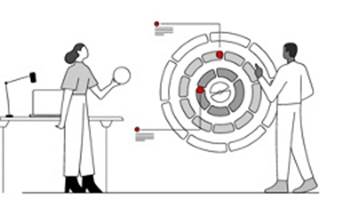
Connected across the board
Private markets – investments in companies not traded publicly on stock exchanges – have been one of the highest-returning asset classes in recent years. To continue responding to client demand and interest, our Private Markets OneBank Partnership in the Americas is broadening access to this fast-growing investment area.
64
Combining the collective strength of our wealth management and investment banking capabilities, we’ve created a more seamless center for excellence for clients looking to invest in private deals or raise capital away from public markets. Regardless of where a UBS client sits across the issuer-to-investor spectrum, they can now benefit from an interconnected and fully integrated cross-business ecosystem. This realignment exemplifies one way we’re delivering on our client promise, while enabling growth across the region and positioning the firm to act on the biggest trends shaping client preferences now and in the years to come.
“This is a business that can deliver the full UBS investment ecosystem to our clients − and we're still only scratching the surface,” said Tom Naratil, Co-President Global Wealth Management and President UBS Americas.



“This is a business that can deliver the full UBS investment ecosystem to our clients − and we're still only scratching the surface.”
For clients seeking to raise private capital, dedicated investment bankers are now embedded as close to clients as possible, in Global Wealth Management's Private Wealth Services Hubs located around the US. They’re working hand-in-hand with our financial advisors to drive focused, proactive identification of private market opportunities – from origination to distribution – among our ultra high net worth and Global Family Office client base.
Feedback from UBS clients, advisors and bankers has been positive, and the outcomes to date fill us with confidence that this divisionally agnostic approach is a business model that works well for all.
Providing more options
Private markets have typically been viewed as more illiquid than other asset classes, meaning that it can be difficult to quickly withdraw cash or assess valuations. Because of that, they have generally been seen as most suitable to long-term investments by institutional investors, such as pension funds or the wealthiest families.
UBS’s partnerships with industry innovators, like iCapital Network and Partners Group, are helping to democratize access to private markets globally, by opening up opportunities previously tailored for UHNW and GFO clients to a broader client base, while also expanding the pool of investment opportunities for wealthy clients seeking alternative sources of yield.
65
Looking to the future
We expect continued strong interest among UBS clients looking for the unique diversification offered by private markets – and we anticipate that our Private Markets OneBank Partnership has the potential to enable us to double the investment opportunities our advisors are able to share with wealth management clients based on their needs, preferences and suitability.
In a sentiment echoed by Jay Williams, a UBS Private Wealth Advisor, we’ll keep our eye on the word that matters most: teamwork.
“Financial Advisors sometimes feel like: ‘I’m the only one who should take care of my client.’ I used to do that myself. But it’s not ‘me’ or ’my team’ – it’s UBS as one that’s going to deliver.”
“It’s not ‘me’ or ‘my team’ – it’s UBS as one that’s going to deliver.”
66
A global community
We’re committed to supporting the communities in which we live and work. Our Community Impact program operates in all regions to make connections where they matter most.
07 Mar 2022 8 min read
Key highlights
1. Our Community Impact program operates in all regions to make connections where they matter most, in the communities in which we live and work.
2. The program is a powerful vehicle to generate social impact and address issues associated with wealth inequality.
3. In addition to our Group-wide goals, our regional Community Impact programs allow us to focus on the issues relevant to our local communities.
Creating a global ecosystem that connects people and businesses to ideas, partners and opportunities is as much about helping people fulfil their individual potential as it is about bringing benefits to society as a whole. By focusing on social impact, whether for one individual or a whole community, we can help to build a fairer society, a more prosperous economy and a healthier environment.
“Creating a global ecosystem that connects people and businesses
to ideas, partners and opportunities is as much about helping
people fulfill their individual potential as it is about bringing
benefits to society as a whole.”
Our Community Impact program is a powerful vehicle to generate social impact and address issues associated with wealth inequality. We work with our local communities to understand the issues they’re facing and develop long-term partnerships to catalyze sustainable change in people’s lives. We focus on supporting education and the development of skills, as key tools in addressing wealth inequality – and areas where our support can make a differential impact. And we enable our employees to help deliver that change through volunteering, which in turn delivers a positive impact on our culture as a firm.
While we always have the bigger picture in mind and operate as one firm with one set of values, our regional Community Impact programs allow us to focus on the issues relevant to our local communities. Take a look at some of our key partnerships from 2021.
67
Welcome to the Swiss workplace: with Powercoders
UBS supports Powercoders, a coding academy for refugees and migrants in a bid to integrate participants into our community and to close the tech talent gap. Both the funding the firm provides and the UBS employees who volunteer (as IT trainers, job coaches and interview trainers) directly help participants to enter the Swiss employment market. After an initial launch in Zurich in 2019, Powercoders was able to secure additional financial support from the UBS Foundation for Social Issues and Education and extend its offering to the Romandie region by opening a “Powerhouse” in Lausanne, offering the same services.
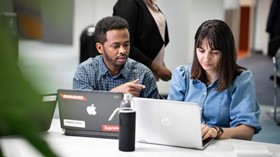

Through internships, we also open the door to our part of the corporate world in Switzerland. Today, 20 former Powercoders work for UBS, either on fixed contracts or as interns in various parts of the firm, including Group Technology. One of them, is Tenzin Gyadhotsang.
“I remember the day I was accepted as if it were yesterday,” he said with a smile. “It was the 9 January and I was so happy to be the first Powercoders participant to receive a permanent position at UBS.”
As a result of the partnership, individuals in need develop the skills to support their own autonomy, Swiss society benefits from skilled tech workers and reduced welfare costs, and our firm diversifies its talent pipeline with fantastic new talent – the Powercoders organization, its participants, the volunteers and UBS all benefit from this collaboration.
Leveling the playing field for female founders of color in the US
Project Entrepreneur, a UBS program designed to level the playing field for female founders, launched the Democratizing the Friends & Family Round program to award USD 25,000 grants and virtual coaching and skills building to 40 female founders of color leading early-stage, high-growth companies.
68
Women entrepreneurs of color have historically been denied equitable access to capital of all forms. Black and Latinx female founders receive less than one percent of venture capital, but the funding gaps start far before founders of color prepare to raise their first venture round. Nearly 40 percent of early-stage entrepreneurs raise initial funding through a Friends and Family investment round. However, because of the racial wealth gap in the US – the disparity in median wealth between people of different races – many entrepreneurs of color do not have access to a network that can provide them with the necessary funding. As a result, entrepreneurs are prevented from testing their innovations, hiring key talent, and having the runway to grow and raise future investments.
“Any time you get that support of people who believe in you and want to contribute to that journey, it makes a huge difference, and I am just so thankful. ”
After receiving more than 12,000 applications to the program, which was launched in partnership with Hello Alice, a multichannel platform that helps businesses start and grow, 65 UBS volunteers reviewed submissions to arrive at the 40 finalists from across the US. Some of the winning companies included STEAM-focused gaming for girls, artificial-intelligence-powered beauty brands, med-tech innovations, and artisanal food products.
“It’s hard building a company from scratch,” said grant recipient Dr. Christine Izuakor, Founder & CEO of Cyber Pop-up. ”Any time you get that support of people who believe in you and want to contribute to that journey, it makes a huge difference, and I am just so thankful.”
Since 2015, Project Entrepreneur has supported female founders with programs to increase their investment readiness, connect them to the networks and resources they need to grow and scale their companies, and expand the ecosystem of support that can help women entrepreneurs succeed. To date, the program has trained 1,800 female founders with alumni going on to raise more than USD 60 million in capital.
Virtual volunteering across the Asia Pacific region
COVID-19 restrictions made it possible for employee volunteers to get involved in projects outside of their own locations. How? All the thirteen markets in APAC joined forces and were connected virtually to support more than 60 community non-profit-organizations, reaching out to the underserved youth and children whose learning opportunities were hard hit by the pandemic.
“It is truly inspiring to see the socially and economically vulnerable children and youth encouraged by UBS volunteers to take a step forward. Many are deprived of the opportunities that we may take for granted.”
69
In total, the APAC 2021 Regional Volunteering Experience (RVE) ran more than 30 volunteering events on 15 days, during which 635 employees were involved and contributed over 1,000 hours to help communities across Asia Pacific. The largest and most comprehensive staff volunteering program to date, it offered a variety of volunteering opportunities, including a pen-pal cultural exchange program between Hong Kong and Japan (which encouraged children to learn about other cultures and languages), a communication skills workshop with teenagers in the Philippines, a toy and book appeal in Australia, read a story a day on international literacy day in India, and virtual activities with school students and senior citizens in Singapore.
“It is truly inspiring to see the socially and economically vulnerable children and youth encouraged by UBS volunteers to take a step forward. Many are deprived of the opportunities that we may take for granted,” said Kumiko Hori, Asia Pacific Head of Community Impact.
Supporting education and skills in Poland
The Stella Virium Foundation promotes life-long learning, education and the acquisition of new skills, primarily for people who might be otherwise excluded from these opportunities. Since UBS began working with the Foundation in 2014, 300 people have graduated from the program, which has supported participants to re-enter employment or change the direction of their career. And 155 participants benefited from the program in 2021.
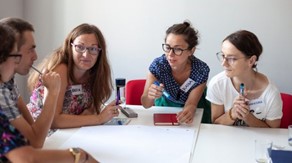
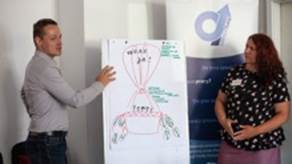
The Foundation helps people to understand the requirements associated with working in a business environment, including multinational corporations, as well as to acquire and develop the skills needed to succeed in that environment. "I believe that this is a great opportunity for people who do not work in corporations to find out what work in a large international company looks like and what is needed to get there,” explained one of the volunteers.
UBS has supported training sessions to develop both soft and technical skills with funding and volunteer support. Soft skills development focuses on areas such as communication and teamwork, while technical skills training increases knowledge of different industries, as well as recruitment processes – complemented with support in actual job searches, applications and interview practice. UBS volunteers act as mentors and coaches, using their experience to help with mock interviews and CV reviews. Overall, the program is designed to increase applicants’ employability skills and chances of getting a job – one graduate of the program was even able to secure an internship at UBS in our Group Finance department, developing their own career path and securing new talent for UBS.
70
While they take different forms, reflecting the differing issues and needs of the communities in which we operate, these four examples illustrate a few of the ways in which we are supporting education and the development of skills to help bring opportunities to people who need them. And we’recommitted to continuing to support the communities in which we work, right around the globe. By connecting people for a better world – one that’s fair, sustainable and gives everyone the opportunity to thrive – and honoring our commitment to support the United Nations Sustainable Development Goals, we all have a role to play in reducing the world’s wealth inequality.
71
The power of philanthropic partnerships: a look at the UBS Collectives
We’re dedicated to finding innovative ways to tackle some of the world’s most pressing social and environmental problems, and showing how the power of philanthropic partnerships will be critical in achieving systemic change.
07 Mar 2022 5 min read
Key highlights
1. The UBS Collectives shows the power of philanthropic partnerships in helping achieve systemic change.
2. We’re dedicated to finding innovative ways to tackle some of the world’s most pressing social and environmental problems.
3. The Collectives’ purpose-driven approach focuses on generating measurable social impact, alongside a financial return that can be recycled into other impactful programs.
For us, connecting people is more than simply about us or our clients: it’s about creating a global ecosystem that links people and businesses to more ideas, partners and opportunities.
Achieving the United Nations Sustainable Development Goals by 2030 means mobilizing an additional USD 2.5 trillion per year. Private markets and commercial capital have generally struggled to address challenges facing the world’s most vulnerable communities. And, while philanthropy and the public sector play important roles, they alone can’t cover this substantial financing gap. A new approach is needed.
While philanthropists can be effective individually, we believe they can be most impactful when working together with organizations and governments as drivers of change. By pooling funds and expertise with fellow philanthropists and delivering aligned outcomes, they can reinforce each other’s efforts, and achieve exponentially more impact. That’s why we’re convinced that connecting people based on their strategic aspirations and collective impact is the future of philanthropic funding.
About the UBS Collectives
Led by our in-house Philanthropy Services team, UBS has formed three Collectives (groups of clients who engage to pool their funds and drive collective philanthropy). By doing so, we can combine their expertise and capital to fund initiatives that address child protection, climate change, and health- and education-related issues. Each Collective provides investors with a unique opportunity to work alongside peers and expert practitioners to achieve systemic change in some of the most complex social and environmental issues of our time.
“Our goal is to mobilize private capital and support effective
programs to address some of the most critical challenges of our
time, which can best be addressed by working together.”
72
The Collectives’ purpose-driven approach focuses on generating measurable social impact, alongside a financial return that can be recycled into other impactful programs. Returns are driven by social outcomes paid for by funders, including the World Bank, UK and US development agencies. Investments will pay out if pre-agreed targets, verified by independent third-party evaluators, are met. These targets are based on science, market incentives and measurable, evidence-based interventions. In this way, they align efforts, incentives and know-how to generate the outcomes that matter most.
“Our goal is to mobilize private capital and support effective programs to address some of the most critical challenges of our time, which can best be addressed by working together,” said Phyllis Costanza, Head of Social Impact and CEO of the UBS Optimus Foundation.


The Accelerate Collective
Through joint impact partnerships, the Accelerate Collective is focused on improving the health and education of disadvantaged children in West Africa and Southeast Asia. It pilots programs that achieve measurable social outcomes – such as improvements in child health, increased education attendance, retention and learning of disadvantaged and out-of-school children, as well as a reduction in poverty. Targeting a return on the philanthropic contribution helps to unlock more private and commercial capital, and can allow public funding to be used more efficiently to replicate and scale these transformational initiatives globally.
The Climate Collective
According to leading scientists, we can avoid the very worst impacts of an overheating planet if greenhouse gas emissions are reduced by half over the next 10 years. But every delay and every degree of warming makes the transition more difficult and expensive, which in turn increases human suffering and speeds up the loss of biodiversity.
73
The Climate Collective provides our clients with an opportunity to work with fellow philanthropists to model, replicate and scale climate solutions that mitigate the effects of climate change, for example, by sequestering carbon emissions using nature-based solutions, supporting local community development and improving biodiversity in Southeast Asia and beyond.

The Transform Collective
The Transform Collective looks to transform childcare for vulnerable families, by partnering with peer philanthropists to co-fund a global child protection program. By seeking to create a model of best-practice for programs that strengthen families, communities and child care systems and, in the process, enable a permanent move away from a reliance on institutional care for some of the world’s poorest and most vulnerable children, the program shows participants what it really takes to change a system.
How a collective effort makes a difference
It’s simple: giving collectively makes funds go further. UBS covers the costs of running the Collectives, matches member funding by 10 percent, and plays an active role in the three-year period of the program. And, while we’re all working together to drive extraordinary results and hone our skills and confidence as philanthropic leaders, the support from the program is making a difference across multiple borders.
74
Please read important disclaimer
The Annual Review is provided as a convenience to our investors, clients and other stakeholders who would like a brief overview of our business, strategy and performance in 2021. It should be read in conjunction with UBS’s Annual Report 2021, which contains more detailed information and disclosure, including management discussion and analysis, and audited financial statements. Details about how to obtain the Annual Report 2021 and other publicly available information about UBS, including the Annual Report 2021 on Form 20-F for the year ended 31 December 2021, are set out in the Annual Report 2021. The information contained in this document is not to be construed as a solicitation of an offer to buy or sell any securities or other financial instruments in Switzerland, the US or any other jurisdiction. No investment decision relating to securities of, or relating to, UBS Group AG or its affiliates should be made on the basis of this document. Unless otherwise indicated, figures are as of, or for the year ended, 31 December 2021.
The use of the SDG logo, including the color wheel, and icons by an entity does not imply the endorsement of the United Nations of such entity, its products or services, or of its planned activities.
Not all products and services described herein are available in all jurisdictions.
Sustainable investing strategies aim to incorporate environmental, social and governance (ESG) considerations into investment process and portfolio construction. Strategies across geographies and styles approach ESG analysis and incorporate the findings in a variety of ways. The returns on portfolios consisting primarily of sustainable investments may be lower or higher than portfolios where ESG factors, exclusions, or other sustainability issues are not considered, and the investment opportunities available to such portfolios may also differ.
Awards were independently determined and awarded by the publication’s editorial team. For more information, visit their website. UBS did not pay a fee in exchange for these awards.
The UBS Optimus Foundation is a grant-making foundation that helps UBS clients use their wealth to drive positive social change for children. The foundation selects programs that improve children’s health, education and protection, ones that have the potential to be transformative, scalable and sustainable.
Cautionary Statement Regarding Forward-Looking Statements
This report contains statements that constitute “forward-looking statements,” including but not limited to management’s outlook for UBS’s financial performance, statements relating to the anticipated effect of transactions and strategic initiatives on UBS’s business and future development and goals or intentions to achieve climate, sustainability and other social objectives. While these forward-looking statements represent UBS’s judgments, expectations and objectives concerning the matters described, a number of risks, uncertainties and other important factors could cause actual developments and results to differ materially from UBS’s expectations. Russia’s invasion of Ukraine has led to heightened volatility across global markets and to the coordinated implementation of sanctions on Russia, Russian entities and nationals. Russia’s invasion of Ukraine already has caused significant population displacement, and as the conflict continues, the disruption will likely increase. The scale of the conflict and the speed and extent of sanctions, as well as the uncertainty as to how the situation will develop, may have significant adverse effects to the market and macroeconomic conditions, including in ways that cannot be anticipated. This creates significantly greater uncertainty about forward-looking statements. The COVID-19 pandemic and the measures taken to manage it have had and may also continue to have a significant adverse effect on global and regional economic activity, including disruptions to global supply chains, inflationary pressures, and labor market displacements. Factors that may affect our performance and ability to achieve our plans, outlook and other objectives also include, but are not limited to: (i) the degree to which UBS is successful in the ongoing execution of its strategic plans, including its cost reduction and efficiency initiatives and its ability to manage its levels of risk-weighted assets (RWA) and leverage ratio denominator (LRD), liquidity coverage ratio and other financial resources, including changes in RWA assets and liabilities arising from higher market volatility; (ii) the degree to which UBS is successful in implementing changes to its businesses to meet changing market, regulatory and other conditions; (iii) the continuing low or negative interest rate environment in Switzerland and other jurisdictions; (iv) developments in the macroeconomic climate and in the markets in which UBS operates or to which it is exposed, including movements in securities prices or liquidity, credit spreads, and currency exchange rates, and the effects of economic conditions, market developments, and increasing geopolitical tensions, and changes to national trade policies on the financial position or creditworthiness of UBS’s clients and counterparties, as well as on client sentiment and levels of activity; (v) changes in the availability of capital and funding, including any changes in UBS’s credit spreads and ratings, as well as availability and cost of funding to meet requirements for debt eligible for total loss-absorbing capacity (TLAC); (vi) changes in central bank policies or the implementation of financial legislation and regulation in Switzerland, the US, the UK, the European Union and other financial centers that have imposed, or resulted in, or may do so in the future, more stringent or entity-specific capital, TLAC, leverage ratio, net stable funding ratio, liquidity and funding requirements, heightened operational resilience requirements, incremental tax requirements, additional levies, limitations on permitted activities, constraints on remuneration, constraints on transfers of capital and liquidity and sharing of operational costs across the Group or other measures, and the effect these will or would have on UBS’s business activities; (vii) UBS’s ability to successfully implement resolvability and related regulatory requirements and the potential need to make further changes to the legal structure or booking model of UBS Group in response to legal and regulatory requirements, or other external developments; (viii) UBS’s ability to maintain and improve its systems and controls for complying with sanctions and for the detection and prevention of money laundering to meet evolving regulatory requirements and expectations, in particular in current geopolitical turmoil; (ix) the uncertainty arising from domestic stresses in certain major economies; (x) changes in UBS’s competitive position, including whether differences in regulatory capital and other requirements among the major financial centers adversely affect UBS’s ability to compete in certain lines of business; (xi)
75
changes in the standards of conduct applicable to our businesses that may result from new regulations or new enforcement of existing standards, including measures to impose new and enhanced duties when interacting with customers and in the execution and handling of customer transactions; (xii) the liability to which UBS may be exposed, or possible constraints or sanctions that regulatory authorities might impose on UBS, due to litigation, contractual claims and regulatory investigations, including the potential for disqualification from certain businesses, potentially large fines or monetary penalties, or the loss of licenses or privileges as a result of regulatory or other governmental sanctions, as well as the effect that litigation, regulatory and similar matters have on the operational risk component of our RWA, as well as the amount of capital available for return to shareholders; (xiii) the effects on UBS’s cross-border banking business of sanctions, tax or regulatory developments and of possible changes in UBS’s policies and practices relating to this business; (xiv) UBS’s ability to retain and attract the employees necessary to generate revenues and to manage, support and control its businesses, which may be affected by competitive factors; (xv) changes in accounting or tax standards or policies, and determinations or interpretations affecting the recognition of gain or loss, the valuation of goodwill, the recognition of deferred tax assets and other matters; (xvi) UBS’s ability to implement new technologies and business methods, including digital services and technologies, and ability to successfully compete with both existing and new financial service providers, some of which may not be regulated to the same extent; (xvii) limitations on the effectiveness of UBS’s internal processes for risk management, risk control, measurement and modeling, and of financial models generally; (xviii) the occurrence of operational failures, such as fraud, misconduct, unauthorized trading, financial crime, cyberattacks, data leakage and systems failures, the risk of which is increased with cyberattack threats from nation states and while COVID-19 control measures require large portions of the staff of both UBS and its service providers to work remotely; (xix) restrictions on the ability of UBS Group AG to make payments or distributions, including due to restrictions on the ability of its subsidiaries to make loans or distributions, directly or indirectly, or, in the case of financial difficulties, due to the exercise by FINMA or the regulators of UBS’s operations in other countries of their broad statutory powers in relation to protective measures, restructuring and liquidation proceedings; (xx) the degree to which changes in regulation, capital or legal structure, financial results or other factors may affect UBS’s ability to maintain its stated capital return objective; (xxi) uncertainty over the scope of actions that may be required by UBS, governments and others to achieve goals relating to climate, environmental and social matters, as well as the evolving nature of underlying science and industry and governmental standards; and (xxii) the effect that these or other factors or unanticipated events may have on our reputation and the additional consequences that this may have on our business and performance. The sequence in which the factors above are presented is not indicative of their likelihood of occurrence or the potential magnitude of their consequences. Our business and financial performance could be affected by other factors identified in our past and future filings and reports, including those filed with the SEC. More detailed information about those factors is set forth in documents furnished by UBS and filings made by UBS with the SEC, including UBS’s Annual Report on Form 20-F for the year ended 31 December 2021. UBS is not under any obligation to (and expressly disclaims any obligation to) update or alter its forward-looking statements, whether as a result of new information, future events, or otherwise.
Rounding
Numbers presented throughout this report may not add up precisely to the totals provided in the tables and text. Percentages and percent changes disclosed in text and tables are calculated on the basis of unrounded figures. Absolute changes between reporting periods disclosed in the text, which can be derived from numbers presented in related tables, are calculated on a rounded basis.
Tables
Within tables, blank fields generally indicate non-applicability or that presentation of any content would not be meaningful, or that information is not available as of the relevant date or for the relevant period. Zero values generally indicate that the respective figure is zero on an actual or rounded basis. Values that are zero on a rounded basis can be either negative or positive on an actual basis.
76
UBS Group AG
P.O. Box
CH-8098 Zurich
ubs.com
© UBS 2022. The key symbol and UBS are among the registered and unregistered trademarks of UBS. All rights reserved.
77
Pursuant to the requirements of the Securities Exchange Act of 1934, the registrants have duly caused this report to be signed on their behalf by the undersigned, thereunto duly authorized.
UBS Group AG
By: _/s/ David Kelly______________
Name: David Kelly
Title: Managing Director
By: _/s/ Ella Campi ______________
Name: Ella Campi
Title: Executive Director
UBS AG
By: _/s/ David Kelly______________
Name: David Kelly
Title: Managing Director
By: _/s/ Ella Campi ______________
Name: Ella Campi
Title: Executive Director
Date: March 7, 2022